#The Fëanorians have a thing for twins.
Explore tagged Tumblr posts
Text
Random moments from The Silmarillion part 4
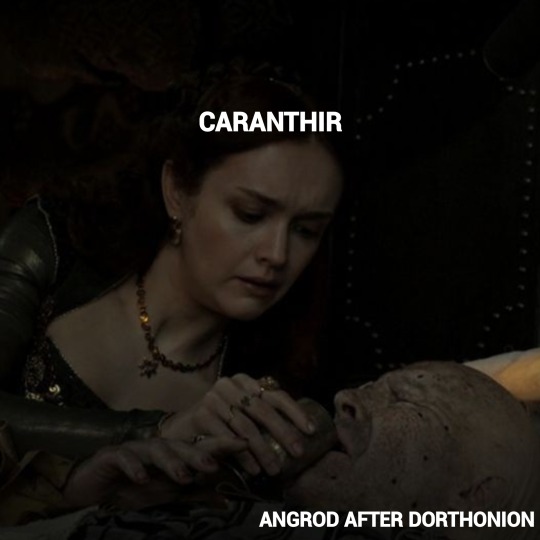

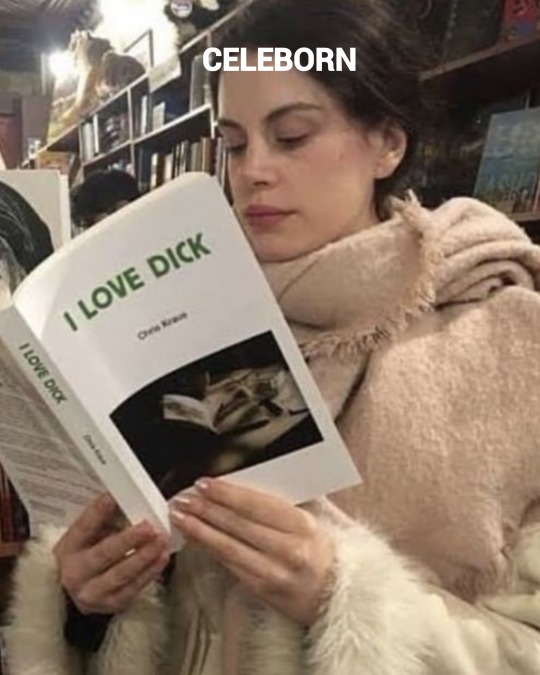
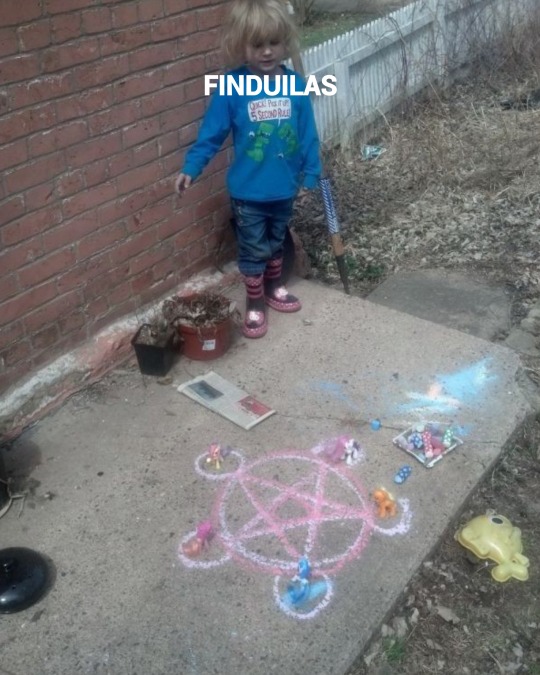
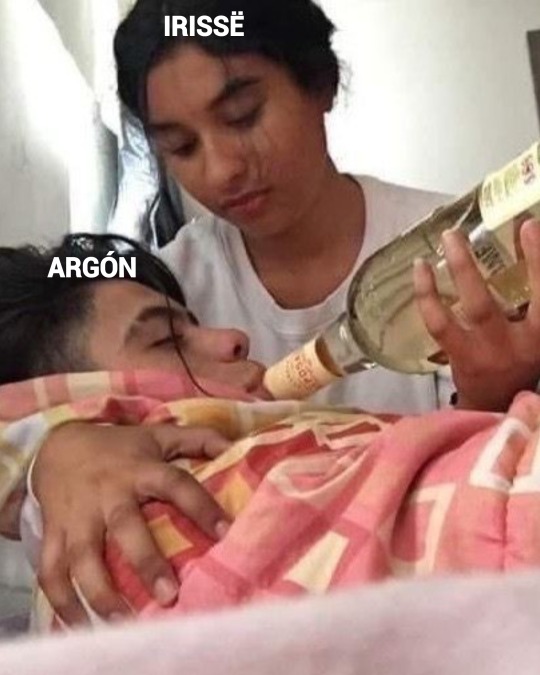
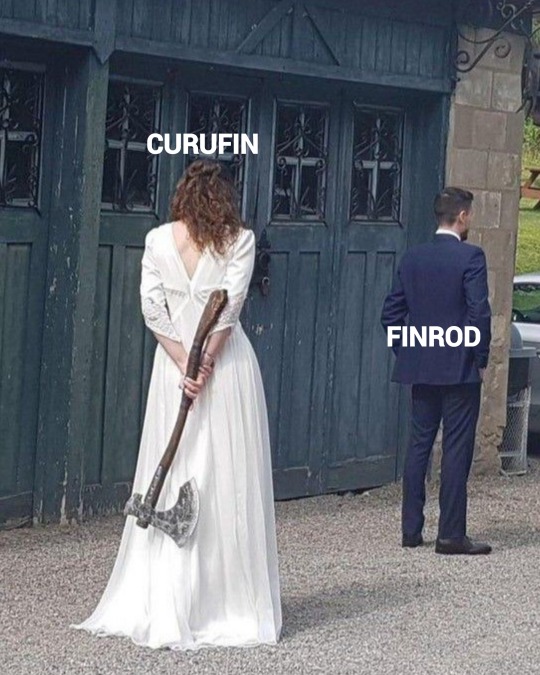
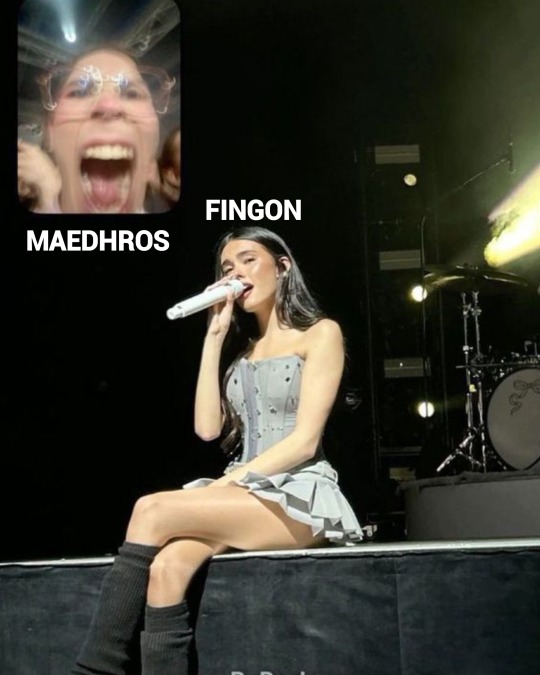

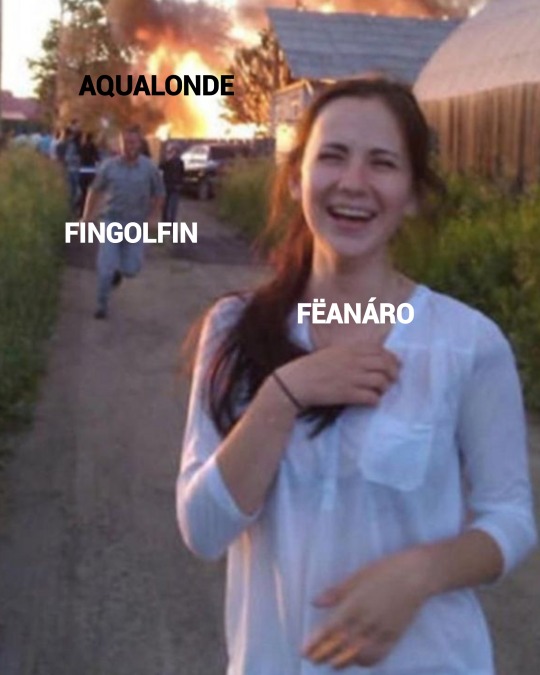
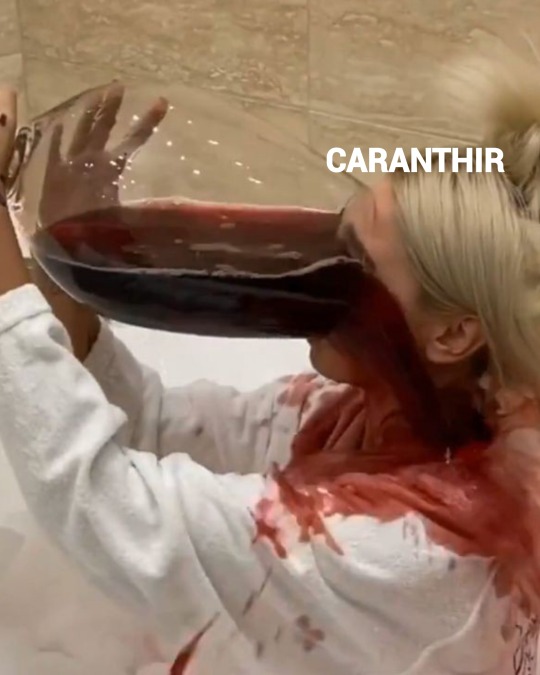
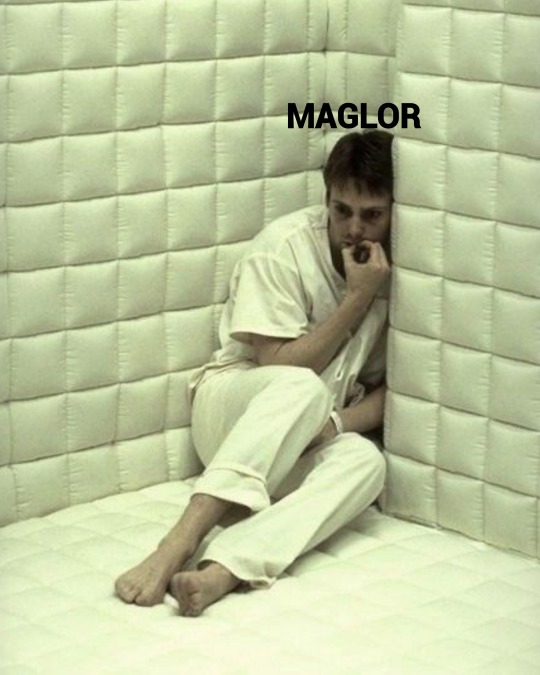
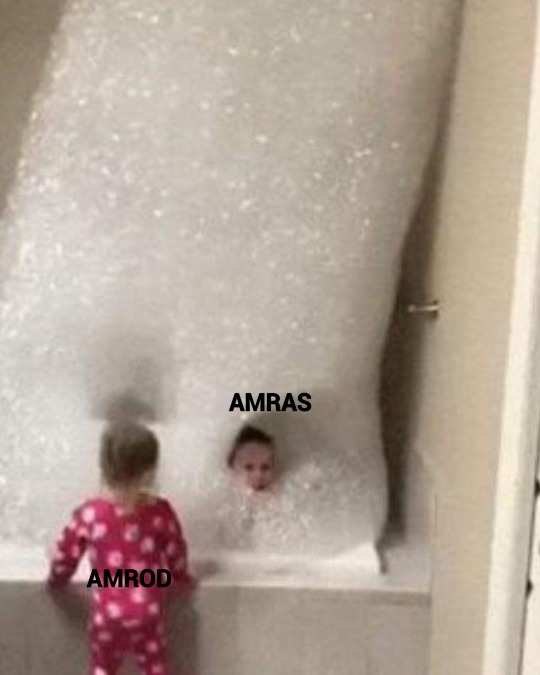
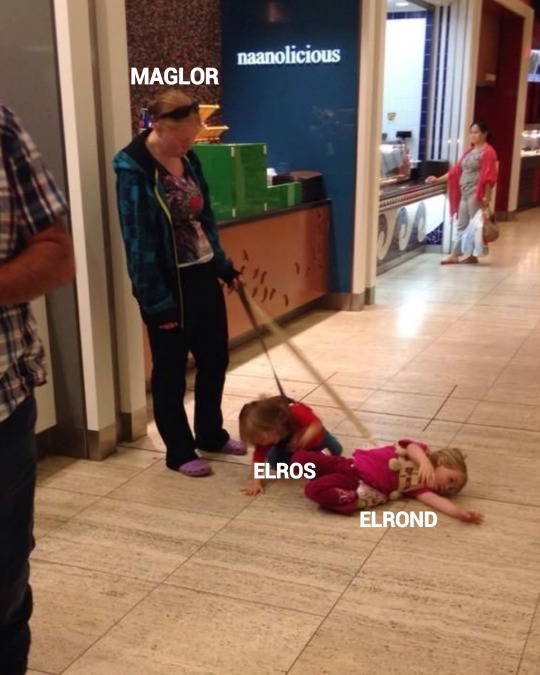
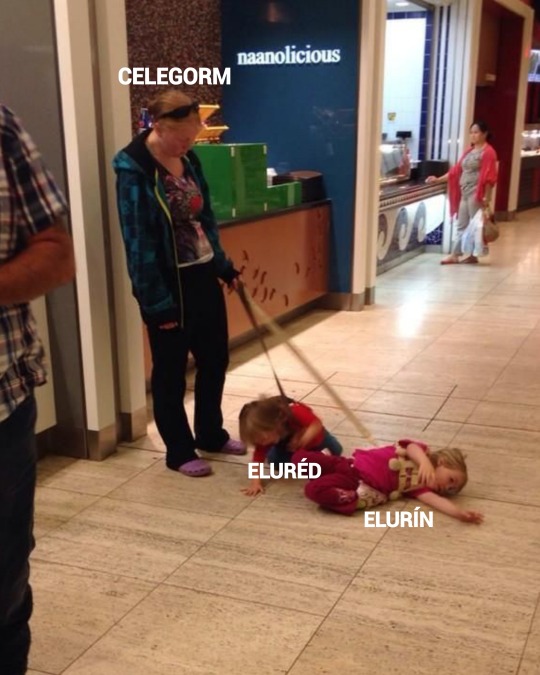
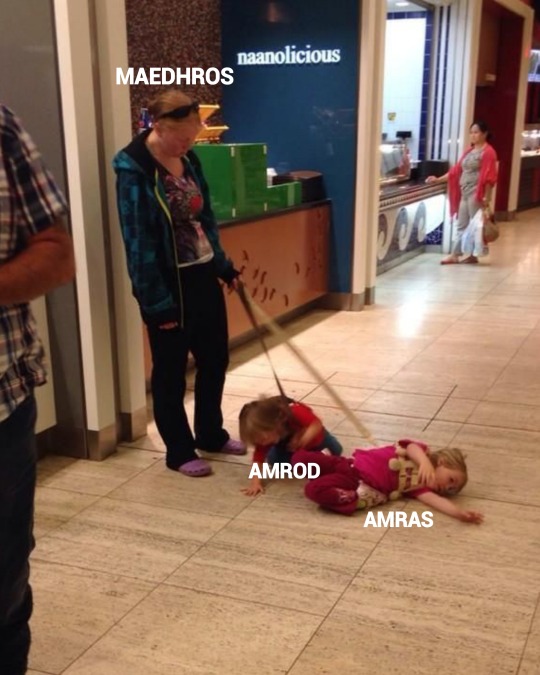
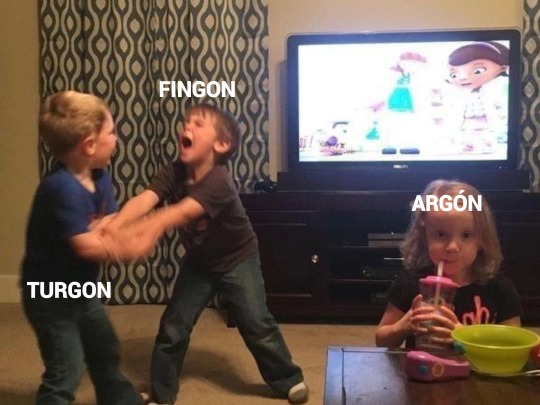
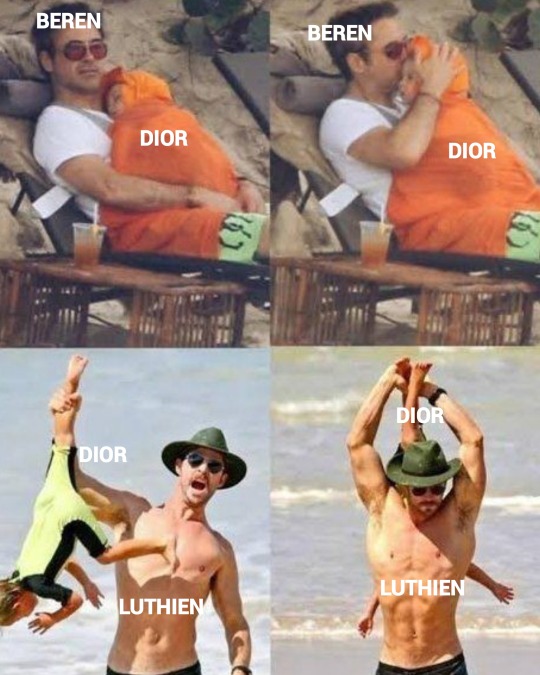
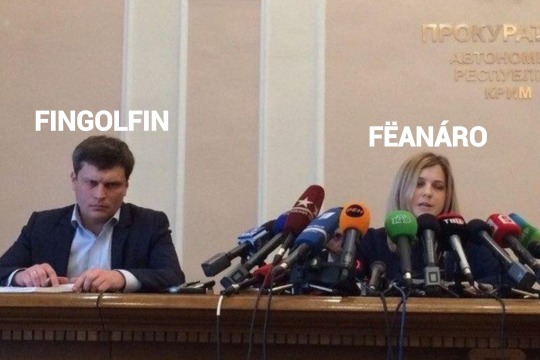
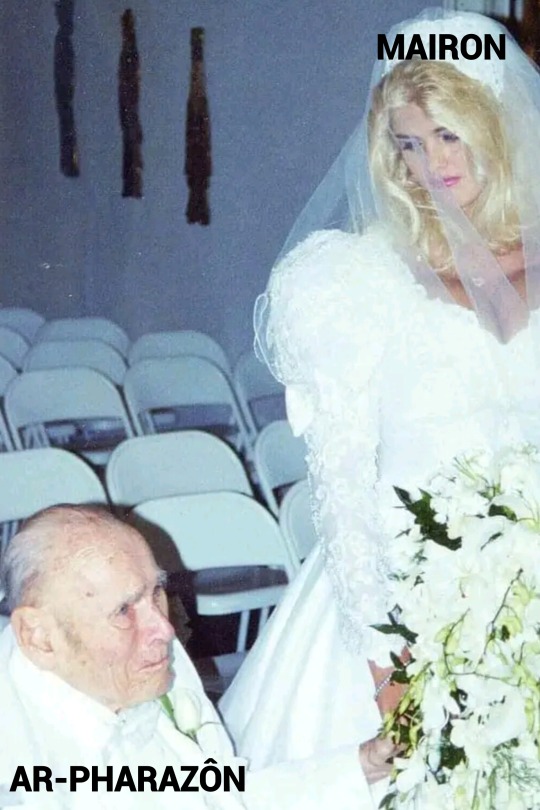
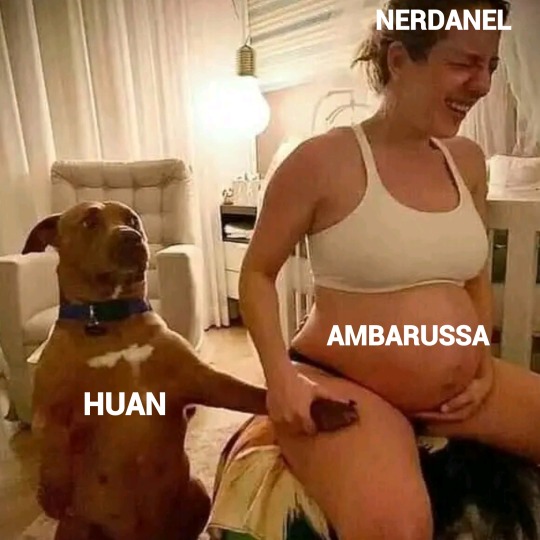
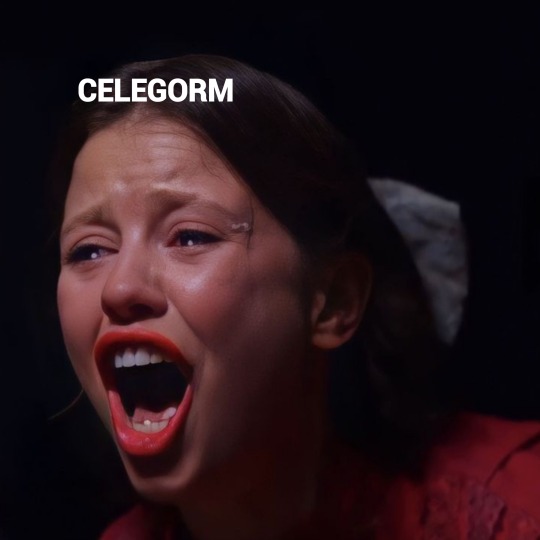
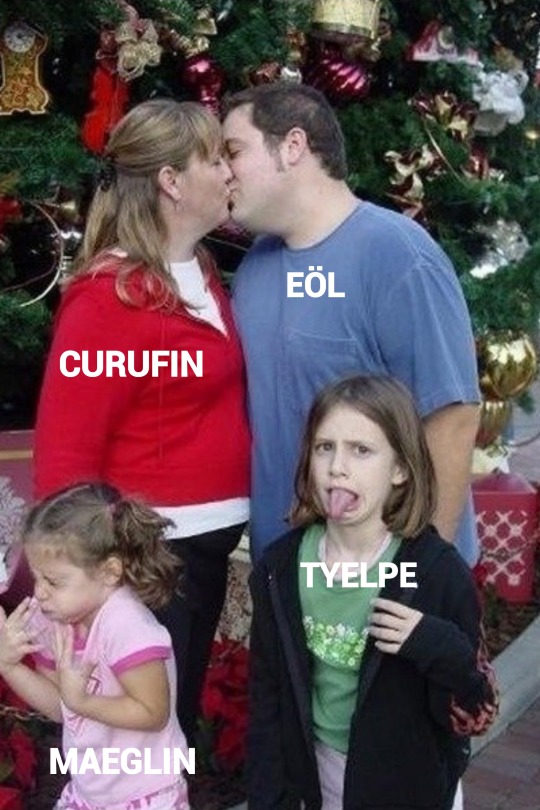
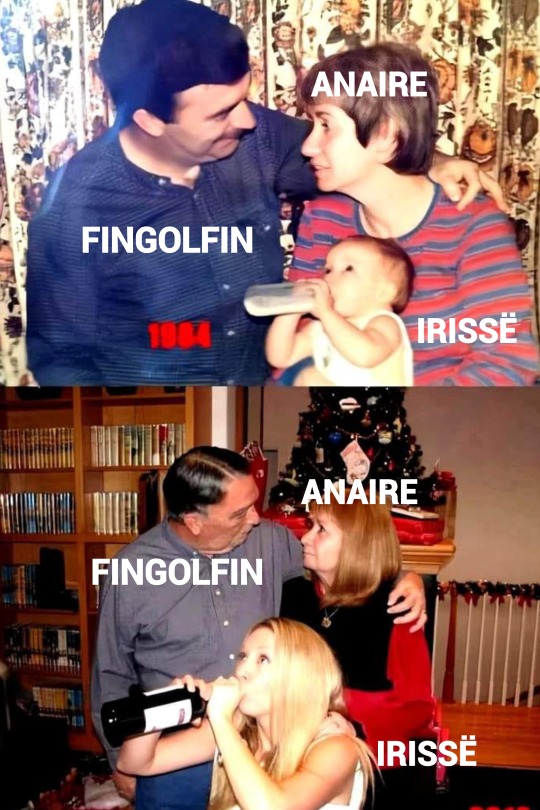
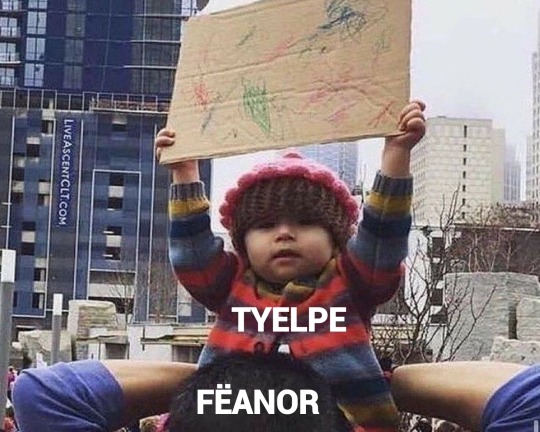
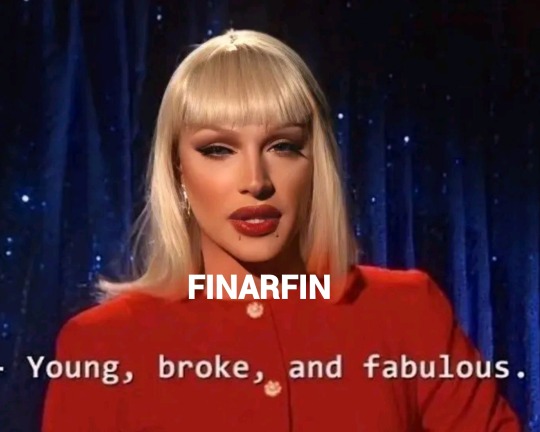
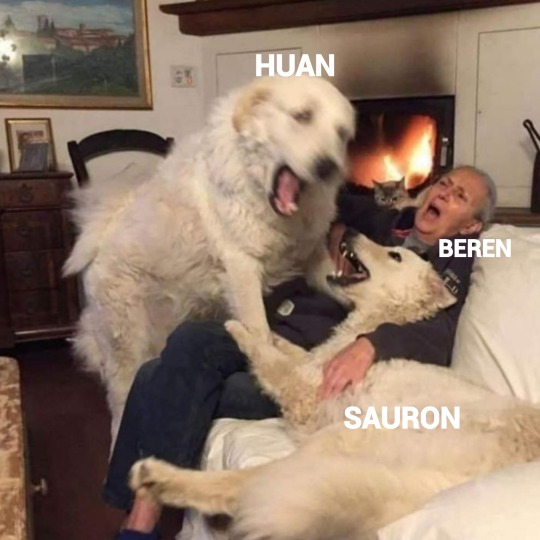
#Fëanor#Maedhros#Maglor#Celegorm#Curufin#Caranthir#Amrod#Amras#sons of fëanor#feanorians#Huan#Fingolfin#Aredhel#Turgon#Argon#Galadriel#Celeborn loves Galadriel's cock#The Fëanorians have a thing for twins.#Caranthir being a trophy husband because if#Curvo's failed marriages#Mairon's worst punishment was having to be Pharazôn's consort.#the silm#silm crack#silmarillion#the silm fandom#the silmarillion
126 notes
·
View notes
Text
Russingon being an incestuous couple is so fucking interesting to me for what it represents narratively. (Yes, I know they are not canonically a couple. No, I do not care, because I do believe the coding is on purpose. Even if it’s accidental, it’s still there.)
If you don’t have a lot of experience with incest in other fiction (for example: the staple gothic horror), incest usually represents deviance. That’s just what it says on the tin: diverting from norms. Usually in a bad way. Deviance can be narratively treated as bad or wrong, and there is plenty of deviance from our meta societal norms with these two, but I digress. I don’t want to talk about that today.
I want to talk about subversion, and the deviance that is sometimes good, actually, and the message that sometimes you must break norms to do good.
[PS guys if you read all this and want to add your thoughts please do! This is kind of half-baked and I’d love to see more opinions because I’ve not seen anyone talk about this much.]
They are so fucking fascinating, because they are deviant! They are! Their entire relationship is baffling politically because of the Finwëan house feuds. More importantly, they have individual deviances that this relationship is telling you to pick up on.
.
Maedhros is a Kinslayer. Maedhros is also arguably the most heroic one of his siblings.
.
No, we can’t burn the ships. How the fuck are we gonna get Fingon over here?
No, I have to go parley with Morgoth.
I have to abdicate the crown because I’m becoming something I don’t want to be.
No, I have to put myself in front of everyone else. I have to hold Himring so the rest of Beleriand doesn’t get nuked.
I have to summon everyone for the Nirnaeth.
.
And then after Fingon dies in the Nirnaeth, Maedhros (as we all know) goes fully off the rails—which is to say, he becomes fully Fëanorian. He goes back to the norm for his family.
There are more Kinslayings. He tries once to save two twin children, and that’s it. He gives up. There is no more hope. Maglor is responsible for taking in the next set. Maglor also wants to beg the Valar for forgiveness, and maybe Maedhros would’ve seen the sense in that once, but instead he becomes the second coming of his father and dies burning, clutching onto his Oath.
The deviance from Fëanorian standards was the only thing keeping him from becoming a monster for all that time.
.
Fingon is also (very likely) a Kinslayer. He’s also the family extrovert and hope incarnate.
Unlike Aredhel and Turgon, he does not seclude himself for his own protection. He does the opposite.
.
No, we can’t just stay here in Aman. We need to protect the other half of our people??
No, we actually have to get Maedhros. Fine, I’ll do it myself then. I’ll reach out to the gods while I’m at it, since none of you will.
Of course we’re going to join every battle. Of course we’re going to help hold down Beleriand.
If I have to face evil alone I suppose I will, then.
.
And he dies when he’s alone against those Balrogs. Fingon is also like his father in many ways—but in some ways he is not. He is brighter, sometimes. He is hope incarnate in the worst of places.
.
I’m far from the first person to acknowledge that what Maedhros and Fingon have going on is a very strong message to never give up hope. But like—not just that. What kills me is that, you know, the hope and the heroism and the goodness is the deviance.
They like each other while most of the Noldor are off getting doomed or fighting with their relatives. You get to those little bits where it mentions Maedhros and Fingon still keeping up their friendship and you kind of have to think “damn, at least some people still genuinely love each other in the midst of all this horror.” It’s sweet. And yet it’s deviant.
And that’s weird, right? Usually deviance is bad. But I think here it’s more neutral. Just presented as: this is not the common option, not the norm. It’s not the common option, but it leads to one of the kinder relationships in the Silm.
The Silm wants you, the reader, to take away that you should have hope and goodness, even when everything around you is hell. Even when it is the hard option. When it becomes hardest to hold up light and help others, that is when it’s needed most.
It will be scary sometimes to be hopeful, and that’s okay. It will be scary to extend yourself. It will be scary to trust and to defend others. That’s okay. Do it fucking scared and keep doing it.
#incest was prob the weirdest way to do this message so idk if I think there’s authorial intent here#but. it’s still fun to read into subtext and pick apart the book#silmarillion#russingon#maedhros#fingon#this was like a little puzzle for me#I spent so long thinking about Fingon because he’s not as clear cut#these two are so deeply compelling. why are you like this guys#if there’s typos ignore them I’m Eepy#I’ve tried to make sure there are no egregious ones but knowing me I forgot an important word somewhere#btw if I start seeing arguments about incest morality please read the room. this is not about that#essay tag
87 notes
·
View notes
Text



Molissë (Moleth) Netiliën, wife of Curufinwë (Curufin) Atarinkë, mother of Tyelperinquar (Celebrimbor) Curufinwë. Silversmith and Ñoldorin exile.
(Lore + close-up under the cut)
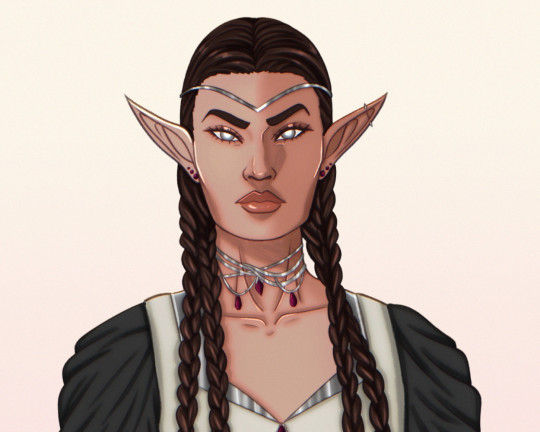

Molissë was born around Y.T.1300 a few hours outside of Tirion in a rural community, born to Ñoldorin parents of a lesser tribe, her grandmother was unbegotten and a distant relative of Nerdanel's mother. Her father was a blacksmith, and a pillar of their community, her mother was a baker. From a young age, Molissë was expected to join her mother in the bakery like her older sisters, but it was soon apparent she had much more interest in joining her father in the forge instead.
In Tirion it was not unheard off of women taking up "manly" crafts such as forging, building and sculpting, but in the islated community such things were much rarer. It soom became clear that Molissë had a great talent in the smithy, especially when working with silver ore. Her father's shop focused much more on practical means, such as tools, construction material and horseshoes, but Molissë soon grew interested in the forging of trinkets and jewelry and other decorative items.
When she was nearly fully grown, she left her family behind to seek apprenticeship in Tirion upon hearing rumors that the High Prince Fëanáro had opened up a spot in his workshop. This was a very rare opportunity, as the Prince rarely took on apprentices. (Nerdanel had insisted he take at least one if he were going to be teaching their fifth son himself, so that he may not miss out on socializing because he didn't go to a traditional school.)
During the trials, Molissë failed to make what she had invisioned and had kicked over a bucket of water before storming outside and crying tears of anger. Seeing her passion, Fëanáro decided to take her on and work with her, for she seemed so much like his own son. He had been right, for Curufinwë and Molissë got along swimmingly and soon became close friends. Rather than staying in the guest house, Molissë soon joined the Fëanorian houshold, dining with them, looking after the twins and helping out in and around the house. It wasn't long before she and Curufinwë had fallen in love.
They wed soon after Curufinwë had reached majority age, but rather than moving out of the parental household, Nerdanel and Fëanáro converted the guest house into a home for the newlyweds, so that they may continue using the forge unhindered. Not three years later they welcomed a son of their own, whom she would name Tyelperinquar and by her husband he became the third and last Curufinwë. Parenthood had come easy to Fëanáro and Nerdanel when they were still young, so Molissë and Curufinwë had expected the same to be true for them, but they had been mistaken.
Motherhood had been hard for Molissë, not being able to give up her passions to care for a baby, she often grew frustrated to the point of tears, becoming quick to anger and unpleasant to be around. Curufinwë didn't fare much better, though they both loved their son intensely. So for the first years of his life, Tyelpë was mainly cared for by his grandparents. Fëanáro and Nerdanel doted on their grandson and rejoiced at getting the opportunity to care for the baby. They knew Curufinwë and Molissë would not ever have a second child.
Because of the short separation from his parents in his formative years, Tyelpë was not very close to his parents at first, but when he grew interested in smithing, the rift was swiftly healed, for this was something they could do, and do well.
Her favourite brother in law had ever been Caranthir, she enjoyed his quiet nature and they shared a love for chess, and like her, Caranthir favoured silver over gold. They often had hot-headed arguments though, because they shared a similar temper. She also enjoyed the company of Maitimo and Tyelkormo, but found Makalaurë's constant signing a great annoyance. She found it hard to get along with the twins until they had grown up.
Molissë got along great with Irissë, Findekáno, Findaráto, Angaráto and Aikanáro, but never liked Artanis or Turukáno and made her distaste known. She was indifferent about Arakáno. She had great love for Lalwendë and Finwë, but not for Findis and her other children.
After Melkor was released and tensions rose in the Fëanorian household, Molissë firmly picked Fëanáro's side, much like her husband. When the tension with Ñolofinwë boiled over, Molissë went into exile to Formenos, which strained her relationship with Nerdanel and ended her relationship with her parents, their relationship had suffered ever since she moved to Tirion and only rarely visited or wrote. Her parents and sisters as such developed a distaste for the House of Fëanor, believing they kept their daughter away, though Molissë acted out of her own will.
When the darkening occured, Molissë was with a squad sent to prepare rations and essentials to take with them to Middle-Earth, and as such was not present for the first kinslaying, but arrived in Alqualondë after the fighting had stopped. She was shocked at the scene she saw, but did not waver in her loyalty to Fëanáro and her husband.
In Middle-Earth she stayed with her family, as such living in Himlad, and took the name "Moleth". There she worked in the forges and helped Curufin, her son and the other smiths with the crafting of weaponry and armor for the Ñoldor. Like Curufin, she had a great admiration for the Dwarves and had their friendship.
She perished in the Dagor Bragollach, being overtaken during the flight toward Nargothrond. Her body was trampled by the other survivors in their panic and pursuing forces from Angband. Her family never knew what happened to her, whether she had died or had been taken to Angband.
Moleth reembodied in the early second age, after the Exile was lifted. She resided for a time on her own, doing forgework in cities that needed it in anonymity, for despite having been the wife of a prince, Moleth never gained much fame or renown. After a while, she reconciled with Nerdanel and started a job as a blacksmith under Mahtan. She lives in a small stone cottage in the hills together with 3 cats.
When she learned of Tyelpë's fate, she went to Lorien to find healing, and strong as she had always been, she recovered in time and went back to her home. There she still awaits the return of her beloved son and husband, Star of Fëanor still etched into her front door.

#my art#the silmarillion#jrr tolkien#tolkien#silmarillion#silmart#feanorians#silm ocs#tolkien oc#oc: Molissë#curufin's wife#silmarillion oc's#silmarillion oc#my ocs#oc art#feel free to use that feanorian star banner thing btw
63 notes
·
View notes
Text
For @silmarillionepistolary day 7, Remembrance and New Beginnings! Artwork at the bottom.
Night has fallen. The lamps have been turned low, the house cleaned, the bedtime routine completed; all Maglor and Maedhros have left to do is tuck the twins and read them their customary story.
They look so small wrapped in the red wool blankets, like two little birds in a crimson nest. They are quiet, too, waiting patiently for Maglor to ask his routine question: “Now, what story would you like tonight? Or would you rather hear a song?”
“I want the one about the Sun and the Moon!” Elros pipes up, scrunching the blanket in his hands eagerly.
Maglor smiles. “Is that what you want as well, Elrond?”
Elrond, the quieter twin, looks bashfully down before murmuring, “I’d like to see the picture book…”
Maglor shares a confused look with Maedhros. They did not own any picture books. “What do you mean?” Maedhros asks.
Elrond tips his head. “The one in your study,” he says. “It’s got gold string around it and lots of pictures on every page.”
Maedhros frowns. “You know you are forbidden from entering my study,” he reproaches.
Elrond bites his lip. “Yes, I know … I just saw the pictures and thought they were pretty.”
Maglor sees the telltale signs of a lecture in Maedhros’s expression, so he swiftly says, “Perhaps we can excuse it this once, if you promise to ask before you touch our things.”
Both Elrond and Elros nod emphatically, and Maglor leaves the room to search for the ‘picture book’ in his brother’s study, which is packed with volumes, scrolls, and papers. Maglor thinks it will take him forever to find the book Elrond described, if it exists at all, but surprisingly he easily locates it in the first bookshelf: a worn book of red leather, tied with a fading gold ribbon. It is familiar to him, but he cannot recollect why until he brings it back into the twins’ room. Maedhros’s eyes widen when he sees it. “Grandfather’s sketchbook? I thought that was lost ages ago!”
“It was in a box in the back,” Elrond supplies.
Maglor looks down at it, a stab of nostalgia and old grief passing through him. “I thought we never even brought it,” he murmurs.
“Can we read it?” Elros asks, leaning forward curiously.
Maedhros frowns, his reluctance clear. There are many memories neither of them want to relive, the life and death of their grandfather among the most heartbreaking. But many of the memories Finwë recorded in his beloved sketchbook were his happiest, from both his life and the rest of his family’s. And the two young children looking up at Maglor are also Finwë’s family … and he wants to share something of his life that is not just the blood on his hands.
The spine of the book cracks softly as he opens it, and the yellowed paper releases a small puff of dust, but the artwork on the inside is still as lovely and life-filled as the day he penned them.
Maglor explains each piece as he showed it to the twins, and lets them look as long as they like. Even Maedhros sometimes asks him to wait a little longer on certain pages, the heavy, dark look in his eyes brightening when he remembers his childhood in Valinor.
It is well past midnight by the time they reach the last pages, and all of them are surprised to see that they are all in full color, when all the previous pages have been only graphite sketches.
“Who are they?” Elros breathes, tracing his finger delicately over the meticulously painted faces.
Maglor swallows, his throat and his eyes clogged with tears. His brother, too, is at a loss for words.
“It’s them,” Elrond says, looking up at the Fëanorians and then back down at thd drawings. “Maglor and Maedhros are right there … but Maedhros looks different …”
It was true. Maglor and Maedhros, along with all of their brothers - still alive and smiling radiantly - and their parents. On the other pages, their cousins and uncles and aunts, before any of them had suffered the horrors of Morgoth.
“That is us,” Maedhros murmurs. “That was us then. We were so happy..."
“What was it like … then?” Elros ventures.
Maglor smiles. “I will tell you.”
“Tomorrow night,” Maedhros interrupts. “It is very late, and if you are to understand a word we say, you must be well-rested.”
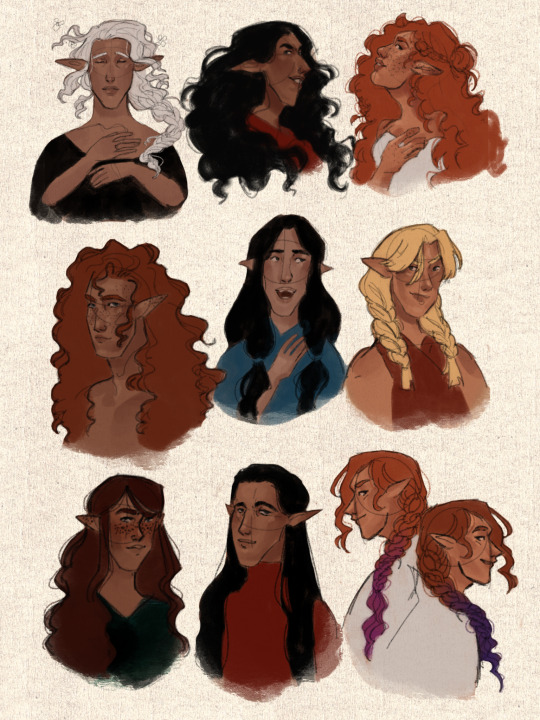

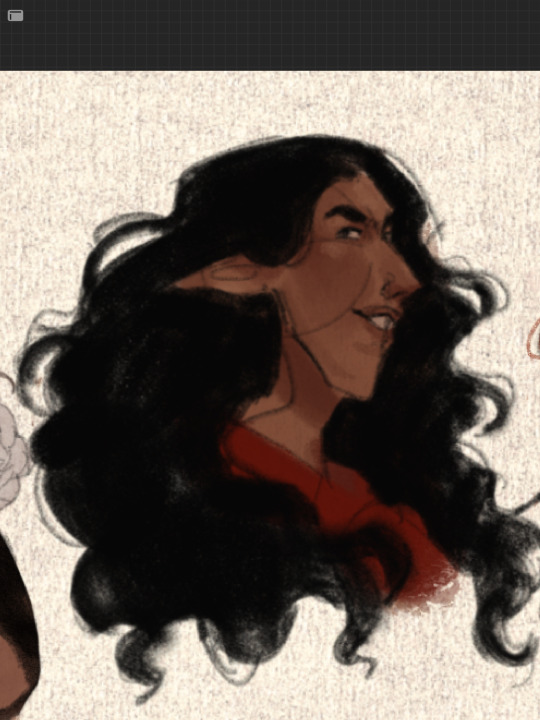
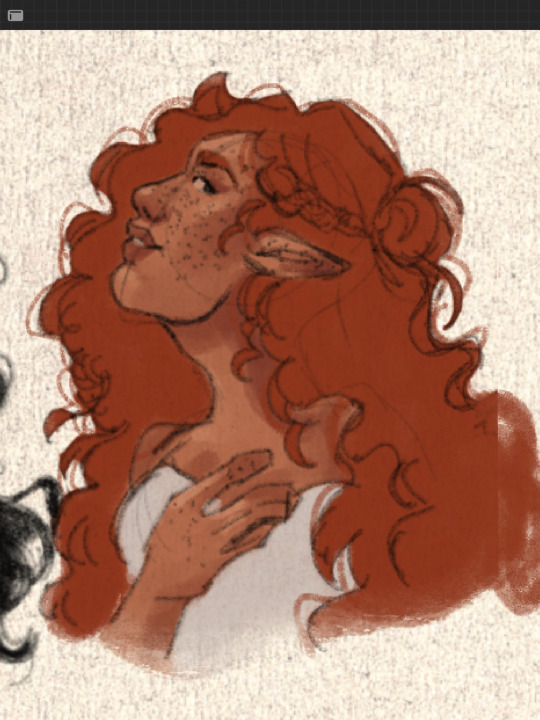



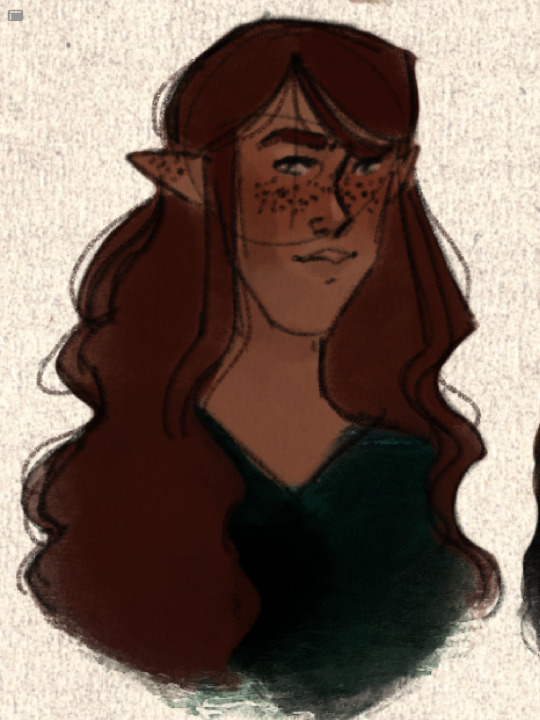


#art#my art#the silmarillion#silmarillion epistolary#finwe's sketchbook#house of finwe#finwe#miriel serinde#feanorians#feanor#nerdanel#maedhros#maglor#celegorm#curufin#amras#amrod#elrond#elros#kidnap fam#my writing#fandom event
154 notes
·
View notes
Text
Kidnap Fam vs Earendil and Elwing controversy: Regarding the twins
Maybe I’m too practical-minded, but I see a lot of people either supporting or exaggerating kidnap fam, hating it with all their being, or ignoring the whole ‘love grew between them’ to translate into ‘emotional manipulation, hatred, resentment… etc (being anti-canon)’. I’ll respect opinions, frankly, I really could care less about them, but it does get irritating when people throw canon away for the drama (I certainly get annoyed when extreme pro-kidnap fams fans make it all sunshine and rainbows as if it wasn’t a difficult time or situation).
By the way, I can and will say that the twins can feel emotions, they are allowed to do that. Resentment and love can exist at the same time (for only a period of time) but one or the other must fade in order for the other the linger. One has to be consumed in order for the other to burn.
But just a thought, Elrond and Elros could love all of their parents equally, no more, no less than the others. One became a healer and the other, a king, I think they came to understand their foster father(s) and their bio-parents’ decisions.
(Ay maybe I just suck at emotions and all this feelings stuff and have no idea what I’m tolkien about)
And I’m not trying to call out or bash anyone!
I saw (and wanted to share) the quote,
“if your anger burns the furnace in your soul your whole life, you will be forever cold in the grave.”(I’m paraphrasing, I can’t remember the exact quote)
I cannot imagine Elrond or Elros being resentful to the point were they are vicious or unforgiving, whether it was towards Elwing, Eärendil, Maglor, or Maedhros (I really don’t think he was involved too much but if you swing that way).
I don’t want Elros to be cold in his grave, and I certainly don’t want Elrond's fëa to be burning for the rest of his immortal life.
Then I also had the thought, 'if the Fëanorians had never committed the third, worst, kinslaying, then Elwing would have never flown the Silmaril to her husband and they would have never gotten the help of the Valar.'
I personally headcanon that it was Eru’s work at hand to have Maglor raise Elrond and Elros. Think about it, what if they were spoiled in an alternate universe? What if something worse had happened to the twins? What if? What if?
What if they didn't become who they were meant to be if it wasn't for who they were raised by?
By the way, I read LOTR, I know Elrond refers to Eärendil publicly as his father and he makes no mention of Maglor. I analyzed this in three ways. 1.) Elrond must keep (the memory of) Maglor closed off, locked in his heart rather than talking about him more. 2.) It would've caused drama in his realm and in the counsel. 3.) Elrond really doesn't care, his father is his father, that's it. Zip. Maglor raised him, but Maglor is gone now. In a way, Eärendil is more present than Maglor in Elrond's life by the third age. Elrond can physically see the star, but he can't see Maglor.
I see it in the third way mostly. Eärendil is Elrond father, biologically, so why would he do this "My 'real' father" BS? It just seems like a waste of time. Tolkien probably didn't want to confuse anyone since the Silmarillion couldn't be published with LOTR.
Remind me of that quote from Yondu, "He may have been your father, boy, but he wasn't your daddy." But I really didn't want to refer to that quote considering Peter and Yondu's relationship is not the best example to compare this cluster of daddy issues to. Nevertheless, there is a point to be made in that statement. There is a difference between relation in regard to Nature vs Nurture, and the effects of it.
I guess the whole point of this post is, the fandom tends to take canon lore to the extreme or over analyze things to the point where they're just projecting. Trust me, I've been there, done that. I've learned my lesson (I think) and I wanted to share what I've learned.
Also (this is purely opinion) I don’t think Maglor was manipulative about anything, in the book, he just didn’t come off that way, for as little as he appeared, he actually seemed to be pretty optimistic (*regarding Eärendil) and honest (*the debate with Maedhros). He didn’t try to excuse himself or get the twins to pity him. Maglor raising the twins was out of pity/mercy, yes, but love grew (like what Tolkien said). He probably educated them on the facts and encouraged them to form their own opinions, whether that costed him their love or not. Maglor did have the more accurate moral compass compared to his brothers (in the end of the book!- Put down your pitchforks Maedhros stans!), especially if he knew that the Silmaril was better beyond their reach than where the enemy can also reach it. It was an accurate moral compass, although not a big one.
Argue, agree or disagree, or discuss with me! I want to hear different perspectives or opinions on this matter.
#tolkien#silmarillion#maglor#maedhros#eärendil#elwing#lotr#elrond#elros#elros tar minyatur#silmarils#silm headcanons#the silmarillion#the sons of feanor#the lord of the rings#Feanorians#I'm not afraid to confess that I over analyse either#whether it's out of spite or not is up to you#I just have many thoughts on this issue which I must get out on paper- or web in this case#Imagine a dragon storing up fire for hundreds of years and finally releasing it in a loud burp#perfect allegory#Love is endlessly abundant#anger is temporarily satisfying yet damaging#oh boy am I bold for putting this in the fandom
113 notes
·
View notes
Text
1st age Beleriand dashboard Simulator

🌫️ mithrim-noldo following
Yeah, Thingol kind of flew off the handle with banning Quenya and all that, but why on Arda are people now justifying the Kinslaying in response?? have some nuance and also, that's just plain horrible.
✨ btw-this-is-hopeless following
hope it's fine to copy your tags, mithrim, because they're great:
#I mean I know this is probably because they've taken part in the kinslaying themselves #but #can't you just admit you did wrong and move on? #in so far as it is possible because of course forgetting would be disrespectful and unwise #because the consequences are with us still #but it should be way more comfortable than being on your defences all the time #always ready to rationalize or deny #with a conscience you cannot silence
✴️ eightpointedstar83
I am tired of typing this out again and again but Alqualondë could have been averted had the teleri been less self-centred and readier to cooperate. Thingol is just another example of this attitude. But of course, please deny that the third clan is what it is and pin the blame on the people who saved everyone's skins.
We have done nothing wrong and yet our own people are turning on us. One day you will rue this.
Long live the house of Fëanor!
💝 heart-in-a-box
This is just the sort of behaviour OP was talking about.🤦♀️
🌫️ mithrim-noldo following
Admittedly, this seems to be a fanatical Fëanorian and more committed than the average apologist of his/her own actions - but yes.
#current events #thingol's quenya ban #my post
11,062 notes

🧝🏼♂️maglorfeanorion following
finished another canto of the noldolante today
🌖 hunters-moon
you have a tumblr account??!
🧝🏼♂️ maglorfeanorion following
do I know you?
🌖 hunters-moon
yes :)
🧝🏼♂️ maglorfeanorion following
wait - yeah, I do...
which of the twins are you?
🌖 hunters-moon
how did you know😮???
👨🏻🦰red-haired-twin
he looked through your blog, nitwit :)
🧝🏼♂️maglorfeanorion following
I guess I shouldn't be surprised to find you two out of all possible people on here...
so - which is which?
36 notes

🌸 a-flower-in-the-snow following
himring winters are horrible and I hate my parents for bringing me to middle-earth
#rant #children of exilse #i meant #children of exiles #coe
4 notes

🏞️ the-wide-earth-unexplored following
Y'all weren't joking when y'all said the Sirion is impressive...

(more photos under cut)
read more
#photography #nature photography #nature #sirion #falls of sirion
213 notes

🖼️ wonder-the-earth
is it still a secret city when everyone is talking about it?
👰🏼♀️ celebrin following
that's a good question
21 notes

👤 incessant-leaves following
It makes me sick to see all those positive nostalgic posts about the Mereth Aderthad. How pretty the pools of Ivrin were or weren't doesn't change the fact that THE NOLDOR WERE HIDING THE TRUTH ABOUT THE KINSLAYING THE WHOLE TIME. Yeah "everyone was kind" back then. You were feasting together with people whose cousins you had killed and have the audacity to complain they don't like you as much anymore. I don't care if you're a Sinda or a Noldo who "didn't take part in it" - if you say anything positive about it I'm blocking you.
#mereth aderthad #the truth about ivrin
159, 307 notes

💎 lord-maedhros-is-the-true-king
Things they don't want you to know about Fëanaro:
read more
157 notes

🏹 huntingprincess following
with all due respect, gondolin is the most boring place in the world.
🌼 golden-flower
it's not. but you're entitled to your opinion.
🌌 daughterofdoriath following
if only all debates on here were as civil...
👤 incessant-leaves
OP is a kinslayer apologist. Didn't you check that out before you started praising them?
🌌 daughterofdoriath following
*throws hands up*
I was admiring that one exchange.
(and this was actually more about @golden-flower's response than about OP)
*sighs*
#this site...
2009 notes

image used for Sirion: link
#I'll try making part two with men in the picture#but I'm posting this for now#unreality#in-universe texts#Tolkien#the Silmarillion#Silmarillion#Beleriand#beleriand politics#first age#noldor#sindar#gondolin#miscellanea
235 notes
·
View notes
Text
in the illustrious history of balrogballs making a joke on Tumblr and then writing a whole ass fic around it, from breakfast blowjob productions, comes a new instalment:
balrogballs joking about a Bollywood Silmarillion adaptation where the Fëanorians are South Asian coded and Elrond, due to his kidnap fam upbringing, has the FUNNIEST colonial hangover known to mankind…
… and then a month later working on a period-AU oneshot set 20 years after the fall of the British Raj, where Surrey-based Elrond returns to India for the first time since he and Elros - the lost children of two British colonial officers - had been taken away from the notorious freedom fighters who found them and raised them.
enjoy an excerpt!
When he and Elros were eight years old, Maglor Fëanorian had told him about the walls of the West. Well, he didn't tell him but Elros had read it in a diary Maedhros kept during his days as a student in London, because Elros was the kind of child who shamelessly used other people’s diaries as storybooks.
So that was where Elrond Peredhel read about the walls of the West. How the bitter water from their seas runs through all the rivers on earth, how high they can rise to keep out outsiders, how they flow from the heart of London and twirl out across the world like barbed wire, propelled by the sea. The walls of Maglor’s house in Kozhikode, Elrond used to think, must have been too high on the cliffside for the sea to reach. As pockmarked as they were, they had always welcomed him and Elros with open arms and a kiss.
On most weeks, when Maedhros got home from another Congress meeting or some revolutionary circle or the other (it goes without saying that none of Maedhros’ comrades knew that he and his brother had taken in not only two grey-eyed British children, but the grey-eyed British children of the sisterfucking chutiya Viceroy’s sisterfucking chutiya secretary), he would always bring them a bag of hot, roasted peanuts.
A bag each! A bag each, because Maedhros just knew things like that, just knew that twins treasured every little thing they didn’t have to share. Even nothing-things like bags of peanuts. On those nights, when Maedhros put down a cushion and sat against the wall, spine to stone, Elrond would lean into his carefully-guarded, coiled-tight body and fall asleep to songs about the walls of the west. They had been very young. They had been young enough to call Maedhros ‘Baba’ and Maglor ‘Abbajaan’, and persist until it meant something.
The house was near the sea. The house that once would have been breathed in, had the sea yawned: these days, it is enveloped by the petrol-diesel-tar of the apathetic Sand Banks Road. Elrond can, had he wanted to, walk to six phone shops, even though he only has one phone. He tries to be content with the knowledge that Kunjiraman Vakeel Palam still exists: that he has to cross it every day to get to his house. The house by the sea. The one in which he and Elros and Maedhros and Maglor had lived and loved with no expectation of being loved back. Two violent freedom-fighters, and the left-behind spawn of the sisterfucking chutiya Viceroy’s sisterfucking chutiya secretary. The setup to a bad joke, the bones of a little life, wrapped in the cloying, earthy red around the house. At some point, a slow, jagged cat had wandered in and never left. He was the thinnest, reddest cat the fourteen-year-old Elrond had ever seen, half an ear missing, and mean for the sake of being mean.
He and Elros had taken half a year to name it. Were you supposed to give an Indian cat an Indian name? It was Maglor who put his foot down in the end. He didn't think he could live with a cat called Ramachandran. That’s simply “too Orientalist, Elrond, even for you. Someone would probably beat you up in school if you and your grey eyes went around telling people you owned a cat named Ramachandran, and I am telling you now I will not just turn a blind eye to it, I will be personally sending sweets to the child’s house”.
So they named it Rusty, and Rusty it was to everyone except Maedhros, who called it nothing, because “a cat that runs away from small rats does not deserve a name.”
34 notes
·
View notes
Text
Some random elf (and Aragorn) headcanons:
-Legolas has blue/brown heterochromia
-Elrohir prefers to dress in blue and Elladan in white
-Legolas is shorter than Aragorn, Aragorn doesn’t let him forget it
-Legolas starts fights for fun
-Arwen is taller than both of the twins
-Glorfindel and Erestor stay on Arda until Elladan and Elrohir leave for Valinor as a promise to Elrond to look after them
-Legolas and Arwen both love dancing and will often dance together for hours during celebrations and events, Arwen spent most of her wedding party dancing with Legolas
-Elladan likes to wear lots of delicate silver earrings and hair accessories
-Arwen can out drink everyone in Imladris
-Elrohir is more emotional than Elladan, he cries much more easily and is also quicker to anger. He tends to lash out at people without thinking about the consequences until it’s too late
-Elladan and Elrohir are among the last group of elves to leave middle earth
-Thranduil’s wife died during the siege of Barad-dur
-Elrohir is very confident in his Choice and he chooses to be an elf, Elladan hasn’t made his Choice yet and that causes Elrohir a ton of mental anguish. Elladan ultimately Chooses to be an elf, but before making his choice he would get into very ugly fights with Elrohir about it (Elrohir started most if not all of them)
-Curufin invented the hair straightener bc of course he did
-Curvo is also the shortest Fëanorian because fuck you
-Elrohir gets up super early in the morning to do shit like “take a walk” and “watch the sun rise”
-Elladan is straight up nocturnal and will stay up until 6am
-both of them have awful sleep schedules and neither of them get enough sleep ever
-they passed this unhealthy trait onto Aragorn
-Aragorn is the lightest sleeper ever and will wake up due to innocuous things like a shift in the wind or a slight temperature change
-All elves have reflective eyes
-Glorfindel’s love language is braiding other people’s hair
#cleaning out my drafts come get y’all juice#headcanons#elladan#elrohir#legolas#Arwen#Aragorn#curufin#glorfindel#lotr#Tolkien#mine
130 notes
·
View notes
Text
My idea of Kidnap Fam is that while there was love between Maglor and the twins during their younger years, it eventually twisted into resentment during their teenage years.
At first, Elrond and Elros accepted Maglor as a parental figure. Being young boys, they needed someone to raise them, but it certainly wasn’t all joy and happiness.
There were times when both twins would feel hesitant whenever they listened to Maglor sing. Elrond always wondered why Maglor would sing of his guilt after he’d committed so many horrible deeds already.
When Elrond and Elros become teenagers, that’s when things change. Whatever affection they feel twists into resentment. They’re beginning to fully understand the circumstances of Maglor’s parenting of them, how he and Maedhros had slain their kindred twice and drove their mother into the sea. All because their father was away from home.
That’s when they become cold towards the Fëanorians.
Elrond refuses to believe Maglor when he sings of his remorse. “How dare you.” Elrond says one evening. “How dare you sing of your own remorse when you slew our mother’s people in Doriath, slew her kindred again, and drove her into the sea! How dare you voice your guilt when you stole our childhood from us!”
Neither Elrond nor Elros will listen to Maglor’s songs anymore. And if Elrond was harsh already, Elros is even more blunt in his resentment. Elros curses Maglor openly, tells him that he’s the reason for his childhood nightmares, that he hopes the Silmaril will never come back to him. To twist the knife further, he hopes that their terrible oath will destroy them the same way they’ve destroyed the people of Alqualondë, the people of Doriath, and now the people of the Havens of Sirion. (Though he will eventually feel a twinge of regret over his words)
Maglor’s guilt worsens, and he can’t even deny what they tell him. From then on, a rift is formed that doesn’t fully go away.
When the War of Wrath begins, Elrond and Elros run away from Maedhros and Maglor to fight alongside the host of Valinor. During this war, they both have time to work through their complicated feelings towards Maedhros and Maglor, and they slowly begin to connect with other kindreds— Elros with Men, and Elrond with the Sindar.
By the time the war is over, and they’re both adults, both Elrond and Elros have managed to work through their feelings. In the end, while they are both grateful to Maglor for being kind enough to care for them in their childhood years, they aren’t ready to fully forgive him for what he and his brothers have done to their kindred and their true parents.
Maybe in time, they will eventually forgive. But they will certainly never forget how the one who raised them was the one responsible for the tragedies of their childhood.
#the silmarillion#silmarillion#kidnap fam#elrond#elrond peredhel#elros#elros tar minyatur#elrond and elros#elros peredhel#maglor#makalaure#jrr tolkien#tolkien#silm headcanons#peredhil#silm meta#tolkien meta
49 notes
·
View notes
Text
Ransom of the Fairy Twins (1/4)
Fandom: The Silmarillion
Relationships: Elrond & Elros, Elrond & Elros & Maglor, Elrond/Gil-galad
Summary: Maglor and Maedhros trade Elrond and Elros to King Gil-galad in exchange for a Silmaril, but they have miscalculated.
A fill for this prompt on the Silmarillion Kink Meme.
AO3 | Pillowfort | SWG
Next chapter

I.
When Elrond and Elros were six, the Havens of Sirion went up in smoke. Their mother kissed their foreheads and sent them upstairs with Evranin their nurse, who had been her nurse before, and promised to see them soon. It was the last thing she ever said to them.
Instead of Mother, a pair of flame-eyed, blood-streaked Elves threw down the bodies of the guard stationed outside the room, and one held Evranin captive while the other ransacked Mother’s room. These invaders took nothing, but threw the screaming nurse aside, and left with the children.
The last time they heard from mother was inside the house, but the last time they saw her was on the cliff-side, where those towering men of ash and blood tried to make a deal with her. When Elrond and Elros were six, a man held a blade to their throats, and promised to spare them in exchange for something else.
It had been a long time since they had heard mother say the names of her brothers aloud, those uncles they had never met—who had died younger than they were then: Eluréd. Elurín.
The last time they saw mother, she was there: and then she was gone.
She didn’t scream, but their captors did. The leaders, and the ones who followed them, all howling and wailing and cursing and running to the edge of that cliff, to burn their stares into the frothing salt water as it battered itself against the rocks. They nearly missed the seabird that went wheeling overhead, out towards the water, out west.
The boys were loaded up onto a horse in front of the dark-haired second son of Fëanor, and so they could not look back and see the ruins of the Havens still smoking. For nearly an hour they rode in complete silence, and then one of the boys tilted his head back, looking up wide-eyed and trembling at the man behind them and asked: “Where are we going?”
“Home,” replied the killer.
II.
When Elrond and Elros were twelve, the sons of Fëanor finally succeeded in making a deal. Gil-galad had come into a Silmaril—and the methods of which do not pertain to this tale—and, by suggestion of his councilors, was willing to offer it to the Fëanorians, in exchange for the lives of Eärendil and Elwing’s two children.
The parchment nearly smoked of how fast they accepted this offer.
Gil-galad sent a small core of trusted advisors to transport the holy jewel, but being unwilling to enter the fortress of Amon Ereb, they left it some two miles out. The land was flat enough the two parties could still see each other. Once it had been deposited, Gil-galad’s men retreated to a safe distance. They watched the sons of Fëanor, the only two left, ride out and examine the jewel. When they had presumably satisfied themselves, they departed, and when Gil-galad’s men returned to the spot, the boys were there waiting.
Each was supplied by Gil-galad’s men with a pony and provisions, and a message was sent ahead to the king. They anticipated the need to travel slower with the children in tow, but the king should be made aware as soon as possible that the plan had succeeded.
“His Grace King Gil-galad offers welcome to the sons of Eärendil,” announced the deputy. The two boys stared dully up at their new compatriots. They each bore some makeshift luggage, ragged sacks and bits of things hanging from their tunic belts.
“Where are we going?” one of them asked at last, almost wearily, as if it were a necessity.
“To the isle of Balar, in Lindon,” said the deputy. “To your new home, we hope.”
“We hope?” echoed the other boy. “What do you mean by that?”
“His Grace offers you a place in his home: you may refuse it, if you wish,” said the deputy.
“You mean we may leave?” said the first boy, narrowing his eyes. The Elf blinked at him, as though they were having a discussion about pink skies and cows with wings.
“You may,” she said. “King Gil-galad does not take prisoners.” The boys exchanged a long look.
“Very well,” they said at last, together. “We would like to meet him.”
III.
The capitol of Lindon was now, for all intents and purposes, the isle of Balar, whose separation from the mainland gave it some minor additional protection from the forces of Morgoth. It was unlike anywhere Elrond and Elros had been before, but for the comforting wash of the waves on the shore, which seemed to reach back into hazy, half-remembered recollections of their childhood, stirring something they couldn’t quite grasp. Balar was an established Elven city, with stone walls and towers and glinting glass windows, and people. Anyone who could get to the island from the nearby lands had, and they were piled on top of each other trying to eke out some measure of safety in an increasingly terrifying world. The twins gawked as they rode through the streets, and were gawked at in return by Elves who had never seen a Peredhel before, only heard tales of those rulers of the Iathrim, but who had heard of the cruel capture of the boys at the sack of Sirion, and of Gil-galad’s plan for rescue.
“Why do they all look at us so?” whispered Elros loudly to the deputy. In their days of travel, the boys had relaxed somewhat around their guards, apparently determining it was unlikely they intended any immediate harm.
“They have heard tales of the last queen of the Iathrim, and of the lord of the Havens at Sirion, and its destruction,” replied the deputy. “All of Lindon hoped that we would be able to bring you out of Amon Ereb.”
“But why?” Elros asked. “We are strangers to them.”
“One’s heart may still bleed for a stranger, yes?” said the deputy. Elros frowned thoughtfully and sat back on his pony. Elrond rode alongside him, and they kept so close together as they wound up to Gil-galad’s castle that their knees were bruised by the end of the day from bumping together.
When they reached the castle, their ponies were led off (they needed no help dismounting) and the deputy gestured for them to follow her inside. The twins shuffled after her, clutching each in one arm his belongings, and with the free hand clasping his brother’s hand.
The architecture of Amon Ereb had been Elven too, finely wrought and carefully planned, but gone to ruination. It had been decades since anyone had properly cared for it, and its present occupants seemed to take joy in spoiling it further. Rarely did anyone of its sparse staff have time to clean, and when they did, the effort was half-hearted at best. Occasionally the boys were set to it, but with no skill or enthusiasm.
Gil-galad’s castle was at the prime of its life, and kept clean to boot.
The twins expected to be led to the throne room—for they had heard such things existed—but Gil-galad met them in a small salon, dressed not in his royal regalia, but something less formal, with only a simple circlet to indicate his office. There was food laid out on a table, which both boys looked to immediately, before turning their attention back to their new lord.
“It is wonderful to finally meet you,” said Gil-galad with a smile. He was fair of face, with oak-brown hair drawn back into a knotted braid, and eyes that seemed both green and brown. Heavy earrings weighed down his earlobes and polished jewels winked at his fingers and his breast. Like all the Elves they had seen thus far in Lindon, outside the soldiers, his dress was splendidly bright, as if Yavanna herself had painted on the colors. “Please, eat.” He gestured to the table, and the young boys decided further introductions could wait: they fell upon the food.
It was hearty and rich, if a less extensive spread than might have been there in years gone by, though this the twins did not know. They dipped soft, white bread in bowls of soup shining with fatty oils and snatched fistfuls of fresh vegetables. They had grown unaccustomed to the taste of seafood, but now they happily scarfed down baked fish, fried oysters, and strips of raw tuna on beds of greens, barely pausing to evaluate whether they liked one dish better than another.
“We were nearly short on supplies,” the deputy remarked to Gil-galad, who responded with faint surprise.
“A miscalculation,” he said. “I trust all else went well…?”
“Indeed, my lord. Easier than anyone expected, truthfully. No fight at all.”
“Are you Gil-galad?” Elrond demanded as soon as his plate was clean, his small shoulders hunched as he spoke. His mouth and chin shone with grease.
“Indeed I am,” replied the king. “Are you Elrond, or Elros?”
“Elrond,” they both replied.
“Then you must be Elros,” said Gil-galad to Elros, who glanced around as if it was possible there was someone else the king might take for Elros.
“What are you going to do with us?” Elrond asked. Gil-galad blinked a moment, but quickly selected his answer.
“Feed you, I think,” he said with a smile. “It seems there needs to be more of that!” The twins continued to stare soberly at him, and the smile disappeared from his face. “I mean to offer you my home,” he said, gesturing with a hand around him. “It seems to me more suited to childhood than Amon Ereb. You shall have teachers too, and there is someone in Balar who can teach you nearly anything you might like to know. And when you are grown, perhaps you will decide to stay.”
“Did you know our parents?” Elros asked after a long silence. Gil-glad again considered before answering.
“I did not,” he said. “I did not have occasion to visit the Havens at Sirion before…before its end.” The twins looked down at the table. “But there are some who did,” Gil-galad added, studying them. They looked up. “You may not have been aware—” He could see that they had not been, “—but there were survivors of that event.” Immediately the twins were sitting up ramrod straight, their eyes alight, and Gil-galad realized he had spoken carelessly. “I do not mean your mother and father,” he said gently, and their disappointment was visible. “But others. They have settled in a place called Greenwood forest, and they are led by a man called Oropher. Do you remember him?”
Elrond and Elros shook their heads.
“If you wish it, I will write to him,” said the king. “He may agree to come and visit, and you may ask him any questions you have about your parents or Sirion.” He could not tell that the boys had any reaction to this.
After food and introductions, the twins were given rooms, one for each of them. They chose between them one room, and fated the other to merely gather dust. They were bathed, and measured for new, properly-fitted clothes (although they were permitted to keep what they had brought), and directed to a few adults they might seek out if they had need, then they were left alone.
“Do you think we could ever find him again in here, if we wanted to?” Elros asked with idle curiosity as he lay stretched sideways over the soft bed. “There’s so many rooms.”
Elrond, seated at the window, arms wrapped around his knees, shrugged.
“There’s so many people,” he said with a faint shudder. Elros made an uneasy noise of agreement.
“There…used to be people,” he said uncertainly after a few moments. “In Sirion. I remember that. There were other children, do you remember? There were Men children. We used to play. We used to play a game with little round stones.”
“That was a long time ago,” said Elrond.
“Perhaps it will feel normal again,” Elros suggested. Elrond shrugged again. They went silent. Elros stared up at the ceiling, which had been painted to look like a summer sky, edged with rolling sea waves. Elrond watched the city beyond the window, and the horizon further out behind the shimmer of the mainland.
“What do you think they shall do now?” Elros asked at last, lowly, voicing the question neither of them had been able to ask while still amid company.
“I would not know,” said Elrond tightly. “Go away, hopefully.”
“There remains still one Silmaril, isn’t that right?” said Elros.
“I don’t care,” Elrond snapped. “They shall probably do something stupid trying to get that one back and get themselves killed in the effort.”
“Probably,” Elros agreed with a shrug. He stretched his arms out over his head. “At least we needn’t trouble ourselves with it anymore.”
“Indeed,” Elrond muttered, hugging his knees a bit tighter.
Gil-galad had expected to see the boys explore the castle, but they remained in the space that was given them until they were called for dinner.
IV.
Gil-galad had not intended for Celebrimbor to still be on the island when the twins arrived. In fact, he had done everything to conceal it from them. The jewel smith had been supposed to be gone more than a week ago, but a broken wagon axel and a squall had kept him around, and it was yet another thing for Gil-galad to wring his hands about. Nevertheless, in the interest of politeness, as Celebrimbor had come at his behest, Gil-galad paid him a last visit after the twins were settled in their beds.
“How are they?” Celebrimbor asked as soon as he had let Gil-galad into his room, twisting his thick-fingered hands together. Celebrimbor was not a small man, and it might have been comical to see him so physically express his anxieties, if Gil-galad didn’t know that he was genuine.
In response, Gil-galad sank into one of the chairs at the hearth and pressed a hand over his eyes. His head tipped back against the chair.
“I do not know how I shall manage this,” he said. He dragged his hand down his face. He rested an elbow against the arm of the chair and cradled his head. “I know not what I’m doing.”
“Surely…anything here is better than there, Your Grace,” Celebrimbor said, settling on the edge of the other seat. “Are they…are they hurt?”
“Physically?” said Gil-galad. “No, I don’t believe so. Can you tell me anything else?” Gil-galad asked, raising his head.
“Everything I can tell you, I have told,” answered Celebrimbor, shaking his head. “As I said, I never spent much time with Maedhros and Maglor. They did not much like children, especially Maglor, in Aman. They were adults; they had not time for me.” He pulled at one of his earrings. “But here in Middle-earth, I have seen…Maedhros brings out the worst in them. He is the most determined of all of them, perhaps even more than my father. He will not allow Maglor to wander off this path they are on.”
“Stars.” Gil-galad rubbed his eyes again.
Celebrimbor, a step away from actually wringing his hands, got up and went to the nearby table to pour two goblets of wine. More, Gil-galad suspected, to have something to do with his hands than any desire to drink. Gil-galad took the proffered goblet and set it down undrunk.
“Have you had any word from the survivors?” he asked. Celebrimbor gave a bleak laugh.
“Me, heard from the Iathrim?” he asked, bitter rue tinging his tone. “I would not reach out to them even if I knew how; they ought to have some peace. I have heard nothing of them since you left for Sirion, except that I understand they have moved into the Greenwood?” He sipped at his wine and his shaking hand dribbled it down his chin; hastily he swiped it away.
Gil-galad stared brooding into the fire, drumming his fingers slowly on the arm of the chair. Then, abruptly, he brought his fist down on the table between the seats.
“We should have been there sooner!” he raged. He squeezed his eyes shut. “We should have been there sooner. We could have had the twins then, and spared them the last six years.” His muscles were a knot at the corner of his jaw.
“You did what you could,” Celebrimbor said softly. “And believe me! You have done the right thing bringing them here. No child deserves to live in Amon Ereb as it is now. Not with them.” He shuddered.
Gil-galad said nothing, but lapsed into stillness, gazing into the flickering firelight. Celebrimbor shifted uneasily in his seat, debating, and then said:
“Will you be alright, having them here, when they have grown?” Gil-galad looked questioningly over at him. “I only mean…as direct descendants of Turgon and therefore of Fingolfin…do they not technically have a better claim to the crown of the Noldor than you, Your Grace?” Gil-galad exhaled and rubbed his eyes again.
“Yes, I suppose they do.”
“And…do you think they might…want it?”
“They are mortal,” Gil-galad emphasized.
“Yes, but…so was Dior.”
“We are not the Iathrim. What is your point, Celebrimbor?” Gil-galad snapped, his nerves worn thin.
“If they chose to challenge you for the crown, what would you do?”
“Give to them and wait,” said Gil-galad flatly. Celebrimbor was quiet, but evidently not satisfied with this answer, and Gil-galad went on: “We do not have time for these squabbles among Elfinesse. How can we think of coups and usurpations at a time like this?” His hand curled up on the arm of the chair, and then he drummed his fingers again, and then crossed and uncrossed his legs, finally sinking once more into stillness under the thrall of the fire. At length, he said, very quietly, almost as if he feared breathing a curse into the world: “We are losing this war.”
The fire popped and crackled in the hearth.
“I know,” Celebrimbor replied, equally soft.
“Círdan still has seen no sign of Elwing, nor of the return of Eärendil.” In response to Celebrimbor’s silence, he added: “If they cannot succeed at bringing help from Valinor, I think we are only waiting for the end.”
“They cannot,” said Celebrimbor gently, as one might speak to a dying pet. “They are mortal, Your Grace. That path is closed to them.”
“They must,” Gil-galad replied. “If they do not…if no aid comes to us…then this war is already lost. If there was a time when the free peoples of Middle-earth had the strength to unite and overthrow the Enemy, it is gone. Without the Calaquendi…without the Valar…I fear the continent will soon go dark. And soon.”
Celebrimbor said nothing.
Gil-galad sighed, and nodded to himself, and rose to his feet.
“Thank you for coming, Celebrimbor,” he said.
“Of course, Your Grace,” said Celebrimbor, rising with the king. “Anything I can tell you which may be of help I am glad to do.”
“I pray we may recover some of the damage,” said Gil-galad, shaking his head. “But only time will tell.”
The next day, Gil-galad’s men hustled Celebrimbor and his small retinue out of the city and no more was said of his visit. It was the last time Celebrimbor came to Balar.
V.
The Iathrim survivors of the sack of Sirion had not been seen since. It was known their small band had traveled east, and settled in the Greenwood, but they had gone quiet after their relocation, and no one had sought them out. It seemed best to let them be; by the measure of Elves, it had been a mere blink of an eye since that terrible day, six years only.
But when Gil-galad wrote, the answer came promptly, and Oropher came forth from the wood.
He would not enter the city, but established a camp on the shore of the mainland, along with the retinue he had brought. In concession to his guest’s understandable wariness, Gil-galad did not summon him to the castle, but brought the twins out to Wood-elves’ camp to meet with Oropher there. The effect on the assembled when they entered the tent was immediate.
One man began weeping openly. Several others covered their mouths and looked away; some others appeared to visibly restrain themselves from more overt reactions. The twins walked forward, pressed together at the shoulder.
In the seat at the back of the tent was Oropher, newly-crowned king of the surviving Iathrim, though he did not title himself as such, preferring to attach his kingship to the Greenwood. He made no claim to be any heir to the kingdom of Elwing. He was perhaps slightly taller than average for the Sindar, with golden hair and blue eyes, and he bore no crown the children could see but a thin wreath of wood and leaf. He held himself placidly, but there was a shadow on his mien, something unspoken, but imminently present. Facing him, Elrond and Elros clasped hands.
“Elrond,” said the king of the Wood-elves. “Elros. My name is Oropher. I have come because Gil-galad—” He glanced past the boys to the king of the Noldor behind them, “—has said you wished to speak with me.”
“King Gil-galad says…” The boy trailed off.
“…you knew our parents,” the other finished for him.
Oropher tilted his head from side-to-side, saying neither yes nor no. It was a gesture that suddenly and aggressively reminded Gil-galad of the Sindar Wood-elves who had joined them in Nargothrond, but he had to push that memory aside.
“I served the house of the Greymantle,” he said. “But my personal acquaintance with Queen Elwing was little, and less still with Lord Eärendil.” The twins shuffled, and squeezed hands, and looked at the floor, then back at Oropher.
“Do you…”
“…know where they are?” the boys finished together, gray eyes turned hopefully on this new king, though the tension of their shoulders suggested they were braced for disappointment. The shadow on Oropher’s face deepened, and he cast his eyes askance, and shook his head at last.
“I do not,” he said softly.
Elros bit his lower lip, and Elrond swallowed hard.
“I cannot answer this question for you,” Oropher said, leaning forward. “But others, I may. And I shall. Anything of Sirion or Doriath is your right to know. I do not imagine your…previous guardians knew much of it.” The effort with which Oropher restrained himself from snarling was immense. He looked up at Gil-galad. “Perhaps we might speak privately.”
Gil-galad hesitated only a moment, before he determined no harm could come to them there, and nodded. He departed with his guard, and might have gone off to other kingly affairs, but he chose to wait until Elrond and Elros emerged with Oropher from the tent. They filed obediently back to Gil-galad’s side, like a dog returning to its master.
“I will leave some individuals here, though we cannot spare more than one or two,” said Oropher, “that they may act as tutors, to teach you things the residents of Balar are not likely to know.”
“Yes, that would be ideal,” said Gil-galad, choosing not to take offense that Oropher did not ask the king’s permission to add to his staff. It would be good for the boys to have teachers that knew the Iathrim traditions and history; certainly Gil-galad knew little enough of it, and he imagined Maedhros and Maglor had known less still. Gil-galad at the least had had a Sindarin mother (though she had been of the Falas, and not the woods). “We would be most grateful.” Oropher nodded.
Gil-galad never knew what Oropher said to the twins in the tent, but they were quiet the rest of the day, speaking only between themselves, and quickly hushing up the moment someone else appeared within earshot. If their hearing was weaker than Elves, they must have learned already the approximate distance at which an Elf could hear them whispering.
At dinner, they were still silent, until one of them—Oropher believed it was Elros, though he could not say why—announced: “We wish to go with Oropher.”
“We were told we might leave,” Elrond added, his small body tensed as if for a blow.
“We were told you take no prisoners,” said Elros.
Gil-galad, taken aback, stared for a moment, and then said, slowly: “If you wish to depart with Oropher, and he would welcome you, you are of course, free to go. It is not my intention to keep you here against your will.”
“He said we were welcome to accompany him—”
“—if we wished it.”
“Very well,” said Gil-galad. “We will prepare supplies for you to take with you.” The twins exchanged a look, then stared back at Gil-galad, but when he said nothing else, they spoke again.
“You really mean—”
“—to let us go?”
“Just like that?” They finished together.
“As you heard,” said Gil-galad, slicing a bit of pork loin, “I do not keep prisoners, and certainly not children. It was my desire to ransom you away from the sons of Fëanor for your own sake, not that I might keep you in their stead. I spoke truthfully when I said you are welcome to stay in my home, but you are welcome also to leave, if that suits you better. I trust Oropher and his people will take great care in looking after you.”
“Oh.” Some fight seemed to ease out of them, and they began to share more frequent looks, and jab at each other under the table, though they remained quiet, and quickly stilled if Gil-galad looked directly at them.
After dinner, he sent a runner out to the camp of the Wood-elves. Not that he did not trust the twins’ report—but it would not hurt to verify with his fellow monarch that this was agreed upon, before he simply sent two children off with them.
#elrond#elros#gil-galad#the silmarillion#tolkien tag#fanfiction#tolkien fanfiction#rocky writes#the silmarillion kink meme
24 notes
·
View notes
Text
Okay so I, like most Silmarillion fanartists, draw the Fëanorian twins as looking like...well...kids. The book says they were the youngest in the family, and we all went, “Okay then they’re children.” Which...yeah, that’s fair. They really just seem to be chilling most of the time, which makes them seem a bit more innocent than the others. But rather early on in my time doing Silm fanart, I thought about how funny if would be if they looked way older than their brothers. But I never did anything with the idea.
Well, after finishing the Fëanorian Week drawings this year I was thinking about how I don’t really draw many Ñoldor due to not having headcanons about many of them. And you guys know by this time that I love a bit of good angst, so I looked at the twins and said, “...ooh goody” and gave them a big old revamp. (The drawing is of Amras and Maedhros, by the way. For one thing, I’ve said before that I don’t like drawing identical twins. And for another…we’ll get into that in a second.)
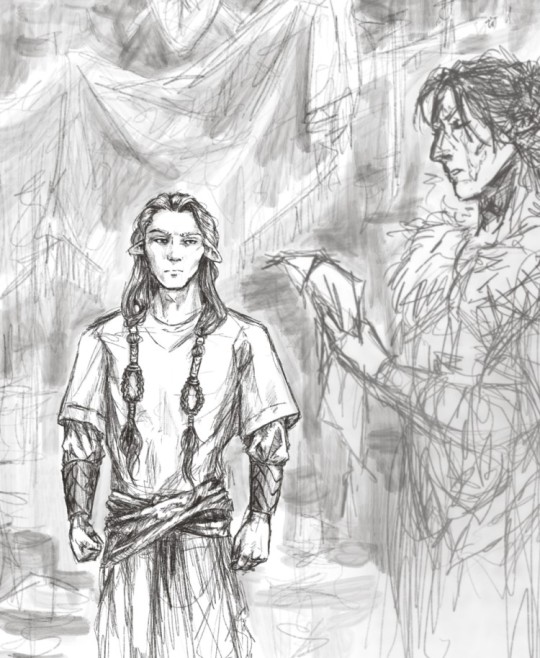
Real quick, for those who aren’t super familiar with the different pieces of source material we have from Tolkien: in the Silmarillion both twins survive most of the story until they die together in the same battle near the end of the book. However, in one lone version of the story, Amrod dies when the ships are burned at Losgar. Okay so. That’s what’s been published, from here on out it’s just headcanon territory.
I think Amrod did die when the ships were burned. Elves are spiritually a bit...different...so I expect twins have a particularly strong bond. Amras wasn’t really able to handle the death of his brother, and went a little bit weird in the head. He believed that half of his own soul died at Losgar, and half of Amrod’s still lived inside of him. For the rest of his life, he answered to Amrod’s names, his own names, and Ambarussa, and signed his name and managed accounts as any of them as well. He refused to acknowledge Amrod’s death and became irrational when any of his brothers mentioned it, so eventually they played along. The story spreads that there were two of Fëanor’s sons that guard East Beleriand, but they are unsocial and rarely seen together. People will report having seen one or the other of them but no one can tell the difference (in reality, this is because there is only one that is still alive.)
It’s uncertain who all knows about Amrod’s death, even among the Ñoldor that came with Fingolfin. Most of the Sindar and Silvan elves don’t know. Probably no humans know. Anyone who does know doesn’t talk about it, and all everybody else knows is what they're told, and this is why in most versions of the story they both survive until Sirion. For a while you’d see one or the other of them out hunting or going to war, and you just assumed the other was doing something else. But then after Sirion no one ever saw either one. Therefore, they obviously both died in the same battle.
Anyway, that’s just the version I came up with. I don’t know if I’ll keep it, but it makes Amras a much more interesting character. And that let me come up with a more visually interesting design, much older than I used to draw them. Whether this was always the way they looked or a change that Amras went through after arriving in Middle Earth I haven’t decided yet.
#amras#amrod#(mentioned)#maedhros#the man the myth the legends#three shinies#my trash#sometimes i overthink stuff#/end classification tags#and that concludes the art dump of the day with a bonus ramble#hopefully i didn't make any typos#or leave out anything major#i wrote this in a bit of a rush
202 notes
·
View notes
Text
Fëanorian Week Day 1-Ash
It isn’t until the moment he realizes he cannot tell Ambarto’s bones from the rest of their dead that he knows the meaning of loss. The concept is still foreign, despite Alqualondë, despite finding Grandfather Finwë on the steps of Formenos.
Even as he stares at the charred, soaked remains, it all feels like some cruel nightmare. It is said that the Fëanturi possess a terrible sense of humor.
The body only looks like Telufinwë in the same sense that a half-finished painting looks like its subject. His freckles stand out against the bloodless pallor of his cheeks in a way that isn’t right- where the flush of adolescence has always lent his skin a certain rosy sheen. It looks nothing like the waxy wanness of death.
Now, his body is lost in the flecks of ash that float up from the burning ships, and all they have left of him is drowned in frigid seawater and an angry, disillusioned mirror image who calls themselves their brother. Nelyo breathes ash and a sense of dissatisfaction.
There is a part of him that can not accept his youngest brother’s death.
He finds himself expecting Telufinwë to come bounding up the shore at any moment, bow in hand, wild-eyed like he’s never been gone at all. He can envision him apologizing to their father, wincing with the same sheepish embarrassment any of them can muster whenever they disappoint Atar.
He finds himself frustrated, seeking out Telvo’s face among the crowd of their followers.
He finds himself wanting to comfort the twins when difficult questions arise, but there is no longer a set of twins, only a singleton.
He notices his absence more than he ever realized he would, and with every passing day that the loss doesn’t grow more real, his gut begins to creep lower and lower with the realization of how deep his affections run for his younger brothers.
Sometimes, he lays awake, composing conversations, even entire scenes in his mind.
He envisions Telufinwë responding to Atar’s death- the shock way his mouth would slip open, the fall of his eyebrows, the sorrow in his tree-bright eyes. He sees his lips turning up hesitantly, fearful but also hopeful.
“What now?” he’d ask, face full of uncertainty, “You are Noldoran. What do we do now?”
He tells Telufinwë about how they should try and deceive Morginotto and hears all too clearly his skepticism.
Telufinwë would question Atar’s word as well. He’d be nervous, yes, but never afraid, bold in a way only the very young can be.
He knows Telufinwë would stare over Curvo’s head with his eyebrows pinched together because it is strange to have to look down to meet the eyes of his superior, even if Curufin is only one step closer to the throne.
In his mind, he watches Telufinwë imitate Tyelko’s crude language and even cruder behavior, although he looks over his shoulder still as if their mother might be watching. He laughs aloud at the thought of it, startling awake Kano.
He pictures Telvo smiling at him when he finally loses his temper with Curvo’s scheming, sees him turn to his twin with a giddy smile and whisper,
“That took long enough, didn’t it?”
and then laughs softly when Pityo’s sharp smile matches his own.
He sees and hears and feels his youngest brother respond to so many new things in Beleriand.
There is so much left to say, but ashes are all that remain of all of them.
@feanorianweek
33 notes
·
View notes
Text
Of firstborns and births.
Fëanor : How did you feel when your first child came into the world?
Maedhros : There were many feelings at the same time. Joy, fear, panic, gratitude, it was too much to process, Artanáro left me speechless since I saw him for the first time, he was too small, more than we expected, however, he was the most beautiful jewel I have ever seen, under Findekáno's words, the baby seemed to be a star itself; and I couldn't agree more with that. While I had seen many babies born up to that point, Ereinion was the most perfect of them all. I felt I could duel Morgoth for him alone, he was the piece I needed to feel alive again.
Maglor : I wanted to cry, correction, I cried too much when I saw it; I was really scared about it. Daeron had not had a really nice pregnancy, and we were afraid that the delivery would be similar. However, thanks to Queen Melian, everything went well. When I finally carried him in my arms, my heart seemed to burst, I am not able to explain how I felt, only that my Lindir was more harmonious than any melody ever played, much more beautiful than Ainulindalë itself. He is magnificence itself, so majestic that many would be humbled to stand in his presence.
Celegorm : Eluréd and Elurín were a blessing from Oromë and Vána, a very unexpected one. I'm not going to lie, when I saw Eluréd it really bothered me not to think that he was the most beautiful baby in middle earth, you know those parents who say their babies were pure beauty, well, I was not one of those, Eluréd and Elurín were not exactly graceful when they were born, they were covered with blood and amniotic fluid, but they were very healthy, that was the important thing, although I can't say I didn't feel joy, they gave me back a part of me that I considered lost.
Caranthir : I must confess that after holding Artaresto already cleaned up, I couldn't help but curse Angaráto's genes. However, I can't deny that the little blonde hair on his little head was lovely. It was really unexpected to see that his cheeks had a tone similar to sweet apples, that made me fall in love with him, I longed too much to put my fingers on his face, I couldn't believe that he was really mine, he was too ethereal, although he was also a fussy baby, a true prince of the Noldor, if you ask me; it was inevitable not to feel proud of him, his mere existence did that.
Curufin : The phrase "You never love anything in the world as much as you love your first child" made sense when Telperinquar was in my arms; although in my heart I vowed to protect him from the moment I began to nourish his Fëa with my own. I know what I felt, a deep love for him, as well as a need for devotion. He was my greatest creation, nothing else I did in the forge compares to him, and even the Silmarils are nothing compared to my son, as I held him, I was aware that I would do the impossible to preserve his innocence, I was sure that he would bring out the best and the worst in me.
°•°
Headcanon's extra :
Daeron is an offspring of Thingol and Melian. Consequently, she has Maia ancestry and thanks to this she was able to father a child with Maglor. (In my AU she is a trans elleth.)
Vána and Oromë blessed Celegorm so that he could have the twins; Dior was puzzled.
Caranthir is trans and Curufin is trans non-binary.
Fëanorian Orodreth!
The other parents of the children :
– Findekáno.
– Daeron.
– Dior.
– Angaráto.
– Findaráto (¿?)
#house of feanor#sons of feanor#feanorians#feanor#maedhros#russingon#maglor#daemags#celegorm#celegorm/dior#caranthir#caranthir x angrod#curufin#curufinrod#erenion gil galad#gil galad#lindir#elured#elurin#elured and elurin#orodreth#celebrimbor#the silm fandom#the silmarillion#silm headcanons#silmarillion#the silm#silm crack#silm au#The silm
36 notes
·
View notes
Note
About controversial opinions, I don't like when in fanfics, Elronde Elros call Maglor or Maedhros their fathers/dads, I like them having complicated feelings for them, love for Maglor, but still guilt and a little anger, even if they are kind and love them, but it bothers me a lot if Elrond calls Maglor his father, says that Maglor is his father too or if the twins say they see themselves as Feanorians
Whoa now, we like to keep the controversy down at polutrope.tumblr.com! But, to be fair, ambivalence can be controversial 😉.
I feel you, Anon. But I suspect you already know this about me.
The El-twins calling Maglor "Father" is actually a good example of something I have become "radically ambivalent" about. I'm not ambivalent about kidnap fam being complicated, but I have become "meh" about calling Maglor "Father, Atar, Atto," etc. He does, canonically, raise them. "Foster father" imo is the most appropriate term for the role he plays in their childhood.
I can see them only ever calling him by his name, or something else (potentially something rude), but I can also see situations where one or both twins would call Maglor "Father" while still maintaining a very complicated relationship to him and to that word applied to him. I mean, how many people out there have complicated paternal relationships and still call Dad "Dad" or whatever?
I became open to it when I started writing this relationship and struggled to convince myself that they wouldn't have ever called him father.
Here's Elros in my fic Scorched, which kind of summarises my feelings on them:
Maglor is to blame. Maglor who failed to guard them from the monster Maedhros became; who gilded his brother with praise and fond looks and gentle words. Even his anger, when it rose, was sinuous and soft. Elros turns on his heel, sharp and resolute, and with hands bunched tight at his sides he seeks the one who by long familiarity has eroded his resistance to naming father.
I don't think it's impossible that Elrond or Elros in their adulthood would continue to think of Maglor as "father", either, if only out of habit. But I'm with you in that I think with their illustrious and diverse heritage, "Fëanorian" would be the last thing they'd identify as. At least not much past young adulthood.
As for Maedhros, well. I've talked about where I stand on that one before.
21 notes
·
View notes
Note
I’ll second that Finrod’s hunting trip with Maedhros and Maglor ficlet ask, if that one resonated at all with you (if it didn’t, please just disregard this haha). I’d be really curious to see what you did with that!
Many thanks to you and @melestasflight for the wonderful prompt! This fic fought me every step of the way, but I'm at least reasonably happy with it, so I'm just going to go ahead and post it. I hope you enjoy!!
By the time he reached Himring, Finrod was weary to his bones.
He had set out from Nargothrond to visit Doriath; since being allowed back beyond the threshold of the fenced realm, he had made the journey as often as he could spare the time. He yet had hope that Thingol and his Queen could be softened towards the rest of the Noldor, and in any case his sister and her betrothed dwelt there, and he missed her company and wisdom dearly.
Often Finrod found nothing but peace and joy in the court of Doriath, for despite his grudge against the Noldor Thingol was kind and wise in the ways of the forest, Melian was generous with counsel and teaching, and their daughter Lúthien - now nearly full-grown - loved to hear about Nargothrond, and told him in return many merry stories of her latest escapades.
But this visit had brought dark tidings, and with it concern for his cousins in the North. It seemed that strange creatures had been sighted north and east of Doriath, and that some had managed to make it nearly past the Girdle by some yet-unknown sorcery. None knew what type of beast they were, exactly, only that several of the outermost marchwardens had been found with their throats torn out, and survivors with little memory of the events besides shining green eyes and a sense of dread.
"I recalled all of my guards immediately further within the Girdle, of course," Thingol had said, "for my lady wife assured me that nothing has passed fully through, and that they cannot match her power."
Finrod had made a bow towards Melian, but then said, "my King, would it not be worthwhile to take a company out beyond the Girdle, and hunt down these things? I myself would be more than happy to assist or even to lead the effort, if it would be of use - those beyond your borders may not yet be aware of the threat -"
Thingol’s face had darkened. "You will not lead any of the Sindar into danger!" he had snapped, before softening his tone. "You are valiant, nephew, and I do not fault your softness of heart - but beyond our realm are those who slaughtered my kin and burned the works of their hands. I will not spend the lives of my people in defense of such, when without loss we may remain in safety here. I advise you to do the same, until the danger is passed," he had added; but Finrod had refused as politely as he could, and left that day to ride to Himlad.
He was sick at heart, for if the knowledge of such danger to the Noldor who dwelt by his borders would not move Thingol, what would? He was reminded forcibly of the tensions of his childhood: Vanya in face, Noldo in body, followed by whispers no matter where he went; expected to laugh at Noldor gaudiness in Alqualondë and Telerin flightiness in Tirion. This was the same, but deadly serious, and he did not know how to resolve it; he had not been able to gracefully walk that line even in Aman, and now so many lives rode on his ability to do so here. Even Galadriel was no help, for she had thoroughly repudiated her Fëanorian cousins and advised him to do the same. She had been born late, long after everyone but the twins, and so did not have many memories to set against the terrible sight of blood on sand and distant flame. She had not grown up with Maglor as a merry third in her games; she had not gone running to Maedhros for advice or comfort; she had never seen the expression of mingled joy and desolation upon Finwë’s face when he looked at Celegorm, the child who in face and body was Míriel come to life.
Pursued by such dark thoughts, Finrod had made his way quickly to Himlad, where he found Celegorm and Curufin away at Amon Ereb. He had warned their seneschal of the tidings from Doriath, and without stopping had gone on to Himring. After all, if anyone would have an idea as to the identity of Morgoth’s new creatures, it would be Maedhros.
Now Finrod sat in the great keep of Himring with Maedhros and Maglor - who was, apparently, visiting; so social, the Fëanorians! - weary and heartsick.
"These are ill tidings, Cousin," Maglor said at last, "and we will arrange a hunt for these beasts as soon as we may. The power to nearly breach the Girdle: that is alarming indeed. For now, though, you should rest and eat. I’m sure Maedhros has a room prepared for you already; we sighted you several hours ago - Maedhros?"
Maedhros’ face was set, and his eyes were flaming. "Eyes of emerald, and terrible teeth…I know these beasts of yours, Cousin. They are nauror: gaurhothrim, it would be in Sindarin." He turned to Finrod, and Finrod nearly shrank back, so terrible was his expression. "He - Sauron - took fëar and forced them into the bodies of great starving wolves, with green eyes that screamed without sound. They had the power of untethered spirits, though they were bound to such terrible forms, and they could do - things -" he broke off, breathing heavily.
Maglor’s face was pale, but he asked, "Why then have we not encountered them long since?"
Maedhros laughed. It was not a happy sound. "They died, over and over. Fëar cannot escape Angband; but they revolted against their forms so wholly that the wolf-shapes were rent asunder, and the spirit left in tatters. Hardly useful. Sauron used to -" he pressed his lips together and did not continue.
"Then - these creatures are Eldar," Finrod said faintly.
"Aye. But slaying them will be no evil, if I am right," Maedhros said. "Death is the kindest gift in our power to offer."
He stood. "But my brother was right, earlier," he said, and it seemed that the great flame in his eyes was banked as he turned again to Finrod. The granite lines of his face softened near-imperceptibly. "You are weary, and I have had a room prepared. Go rest. You are welcome to join us in the great hall for dinner, or to send for a meal to your room, whichever seems best to you. I will leave at first light with my brother and a company of warriors. I advise you to delay your departure until our return, but if you must go, tell me and I will arrange for an escort."
"No - I wish to come with you!" Finrod protested. "I would not have my cousins ride into danger without me."
"Thingol’s reaction, should the King of Nargothrond fall in our company, does not bear thinking about," Maedhros said wryly. "It would not be wise."
Finrod set his jaw. "I can help," he said, and found he meant it. The thought of a spirit tethered so cruelly smote his heart. "I have learned much of songcraft from Melian the Maia: songs that can counter the necromancy of Sauron. Perhaps I can - at least ease the passing of these creatures."
"I sing, also," Maglor observed with a trace of humor, "and have faced the fruits of Sauron’s labors before, if in lesser bodies."
"Two voices will be better than one, surely," Finrod countered. He looked at Maedhros. "Please, allow me to accompany you."
Maedhros looked at him for a long moment. "Very well, Cousin," he said at last, "if only because I suspect it would be difficult to prevent you from following. You have the kindest heart of us all, I deem; and perhaps you will be able to do these nauror some mercy. I do not have it in me. We leave at dawn; be ready."
"If you find yourself too weary, do not come!" Maglor added. His sharp face was full of concern. "None will hold it against you."
"Thank you," Finrod said. He smiled at his cousins. "I will not let you down."
The next morning, refreshed in body if troubled in mind, Finrod rose before dawn and was ready in the courtyard when Maedhros and Maglor emerged. They were in light armor and leathers, as he was; and they were followed by a dozen grim-faced Elves.
Maedhros nodded at him; Maglor said, "Good morning!" and even offered a smile.
Finrod smiled back.
"I have procured a horse for you," Maglor said, gesturing to a beautiful roan he held beside the one he rode. "Your own horse needed more than a night of rest."
"Aye," Finrod agreed. "I thank you." He approached and stroked the mare’s nose. She whickered a greeting in return, and nosed his hair. "What is her name?"
"She is called Hirfindë," Maglor replied, laughing a little, "for as a filly she had a terrible habit of chewing on one’s tresses, no matter how tightly plaited."
Finrod looked down in some alarm; but Hirfindë was only sniffing, not chewing. "You have grown out of that habit, I trust?" he said aloud to her in amusement.
She whuffed, as if to say, of course.
There was a general rush of mounting and a flurry of orders from Maedhros; then the company passed through the great gate of Himring, going south and west towards Doriath.
The first day passed without event; Finrod strained all of his senses, but could not detect even a trace of the wrongness that signaled creations of their Enemy. By their expressions of frustration, Maedhros and Maglor did not have better luck. They did not stop that night, picking their way softly by the light of the stars; and by late afternoon of the second day they picked up a trail. The horses became nervous, shying at nothing; and sharp-eyed Maglor spotted the faint outline of a paw in the grass. But even without those signs, Finrod would have known that the creature was near. Despair was in the air. It was so thick he could nearly taste it, and had to set his will to prevent dark dreams from flashing before his waking eyes. I am sorry, he thought sadly to the creature, we will release you, if we can.
But despite the miasma that could be sensed by everyone in the party, the nauro - or nauror, Finrod supposed - proved elusive. The second day and night passed without success. Maedhros rode stone-faced at the head of their party, responding to Maglor’s tentative conversational sallies in monosyllables at best; Finrod tried to engage the rest of their party in conversation, but the other Elves were quiet and withdrawn, and in truth he himself found that talking sapped his energy more than he was accustomed to. The air felt heavy and filthy in his lungs.
But on the third day, they ran the creature to ground.
Maedhros was the first to spot it, of course: as the horizon faded from gold to blue at the start of the day, he sat forward suddenly and said: "There."
Finrod followed his gaze and caught the barest flash of grey bristle between trees.
"It will flee from us, I expect," Maedhros said, signaling for speed, "Its self-preservation instincts will be strong. We must run it to ground."
As he leaned forward to keep pace with his cousins, Finrod wondered for a moment why the creature was not stalking them in turn; then he remembered what Maedhros had said of the nauror in Himring, and felt abruptly sick. Doubtless any spirit successfully tethered in such a way would have had to be - warped, or changed, such that survival of the body became paramount over all other considerations. And indeed it continued to flee from them, until in the early afternoon they ran it to ground.
The first sign of such was Maedhros’ abrupt, "It is nearing the end of its strength; be wary." A short minute after, Finrod could sense it for himself: a thickening of the poison in the air, a sudden sense of weariness that dragged at his limbs. There was a stench, too, so close. Old sweat, rotting meat, traces of filth: the scent of a creature that did not wash itself, and cared for nothing but its own ravenous hunger.
Mingled pity and revulsion welled up in Finrod’s breast; he felt nauseous. By their expressions, Maedhros and Maglor’s chosen hunters were not doing much better. Maedhros and Maglor themselves were twin walls of impassivity, though if Finrod looked closely he could see faint lines of worry about Maglor’s mouth.
Following the smell, the sound of the nauro could be heard: it was crashing through underbrush, growling low in its throat.
As one, the hunters drew their bows. Maglor in the lead dropped back to Finrod, for their role would be as Singers only. Finrod tensed, every nerve alight with anticipation as he scanned the brush for the source of the heaving breathless growl - there! A flash of green in the shadows! - a hail of arrows whistled through the air and the terrible eyes winked out for a moment - then suddenly the Wolf with three arrows in its throat leaped upon Maedhros with a terrible gurgling roar. Elf and nauro rolled together from Maedhros’ horse, landing heavily upon the ground. Maedhros had his dagger out and was slashing grimly at the Wolf’s head with his left arm; his stump was driven into the nauro’s neck, forcing its jaws backwards. The creature was tearing up great clods of earth with its claws in its frenzy to get to Maedhros; the hunters had swords in hand and were approaching with faces set.
"Hold!" Maglor cried suddenly from behind, a clarion that filled Finrod’s ears and slowed everyone for a moment, even the Wolf, "I will Sing! Hold!"
He began a Song of sleep, which dragged Finrod’s eyelids down despite the warning. With an effort he shook himself and saw the archers about him doing the same. Only Maedhros seemed unaffected, grimly holding the Wolf off. Its struggles slowed slightly as Maglor sang, and Maedhros flipped it onto its back and plunged his dagger into its head.
Still it would not die, though it was bleeding from half-a-dozen arrow wounds and should have been killed instantly at Maedhros’ last blow. It whined once, short and sharp, and flung itself again onto Maedhros.
Watching it, Finrod felt sorrow well up in his throat. He thought of the Quendi who had loved their freedom under the stars, and found as their reward servitude without end to a cruel master. A song came unbidden to his lips: a song of traps broken, chains wrenched apart, the empty shackle upon Thangorodrim. After a moment he heard Maglor’s voice join with his own, deeper and more resonant.
The Wolf stood stock-still, panting terribly, its blood dripping to the ground; then as Finrod kept singing with Maglor, it wavered visibly and finally lowered to the ground. It was breathing heavily now, the sounds of an animal wounded to the death. For a moment it seemed to Finrod as if the nauro had two sets of eyes, one green and one silver; the green wolf-eyes were confused and terribly hungry, the silver eyes heavy with sadness and a relief so profound it was almost a pain of its own.
As they dimmed, both terrible eyes met his, and suddenly it seemed to Finrod that the Wolf spoke with a voice of spirit: well-met, master of illusions. Your teeth are sharp and your nails long. I thank you, freedom-bringer; and I am sorry.
Finrod blinked - master of illusions? - and suddenly in the time between one blink and the next he Saw -
eyes that were weary as the Eldar were never weary, looking into his own with love that seemed rooted in the very earth -
laughing beside a fire, with the owner of those selfsame eyes, the giggles and shrieks of children at play in the background: so many children! He had never seen so many even in Aman -
nut-brown locks and a bitter mouth, spitting wisdom angrily -
The same bitter mouth, now framed by white hair, hurling insults with fondness behind them -
Mud in his hair and his ears, caking his clothes, deep spreading pain in his shoulder and wetness following, creeping dread chased away by the low sound of horns that were familiar yet strange -
Dark stone, and chains, and green eyes that glittered feverishly in the dark, and his head resting on wasted legs as the breath whistled strangely from his chest -
Finrod came back to himself with a ragged gasp. He felt a shift in the air, a barrier melting away, and there was only a dead animal on the ground.
He had to go East. He felt it, the call of the vision. It could not be gainsaid, terrible as it was - and the love in those old-young eyes - and so many children -
Maedhros picked himself up off the ground and approached. "My thanks, Cousin!" he said, almost smiling. "Your skill with Song has grown greatly since last I heard you."
Finrod inclined his head and smiled in return. "Thank you for allowing me to accompany you," he said warmly. "But I fear I must depart."
"So soon!" Maglor exclaimed. "Why? There may be more of those creatures roaming about, and you must let us treat you to a full supper back at Himring -"
"Maglor makes very free with my hospitality," Maedhros interjected, "but he is quite right about the danger, and about the dinner too. What is the matter?"
"You needn’t worry," Finrod said almost gaily, "But no gaurhoth shall touch me yet. It is not my fate. I must go East," he added more soberly. "I have Seen it."
His cousins continued to protest; but he held firm, and at the last they yielded and sent him on his way with his borrowed mare, all the provisions they could spare, and kind words aplenty. He directed Hirfindë due East, and gave her her head.
Out in the open, wind against his face, cousins receding rapidly into the background, he was not sure whether to laugh or cry. Such a fate - such a fate! The joy - the love - the children! Not his own, but they loved him, and he them: he had felt it.
But no light at the last! It was terrible. Could anything be worth the creeping hopelessness he had felt, in the last seconds of the vision? He could turn around, go back to his cousins, leave Fate alone in the East. Perhaps she would not call a second time, and he could go forth in hope to an unknown ending.
But those eyes! He had never seen anything like those eyes! And the children!
"I will go, Hirfindë," he said aloud. "I cannot do otherwise."
As he rode towards Ossiriand, he thought he heard snatches of song on the wind: too deep to be Elvish, too fair to be Orcish, in a tongue he did not know. Who was singing? Such joy, in the bitter East!
He raised his own voice in answer.
#finrod#balan (in spirit)#maedhros#maglor#thingol#my writing#silm fic#the silmarillion#ok so I am aware this is like. comically different from the typical interpretation of their hunt#but like#personally I can’t see Maedhros the hypervigilant and paranoid going on a chill outing with his cousin#no matter how many years of peace they’d had#also me writing any fic abt finrod: how can I make this secretly abt bëor
94 notes
·
View notes
Note
Elwing/Eärendil, 40
40. because the world is ending
And it is sung that she fell from the air upon the timbers of Vingilot, in a swoon, nigh unto death for the urgency of her speed, and Earendil took her into his bosom; but in the morning with marvelling eyes he beheld his wife in her own form beside him with her hair upon his face, and she slept. - The Silmarillion, of the Voyage of Earendil and the War of Wrath.
~
Elwing awoke screaming. She thrashed within Eärendil's hold in his cramped cabin bed as the waves rocked the boat beneath them, and he pulled back and stood up, giving her room to move. There were too many thoughts racing through his mind at once.
How had she come to be here? Was she badly hurt? Where were the boys?
~
When he had first beheld the face of his wife where the bird had been, he had wept with relief. The sight of the great albatross with the nauglamir clutched in its beak had been a horror, for the jewel was ever around Elwing’s neck, or in a locked box beneath the floorboards in their bedroom - she would not have relinquished it while she lived. Eärendil had sobbed into the feathers of the bird, despairing.
Then the image of the albatross had shimmered as though in a dream, and before him had laid his sleeping wife.
~
Elwing's screams stopped almost as soon as they had begun. She sat up suddenly, her dark hair damp with sweat and her face leached of all colour. Eärendil felt his chest ache- he longed to rush to her side, to give whatever comfort he could, but years of waking up to Elwing's nightmares had told him that at least right now, she would not wish to be touched.
She stared around the cabin, eyes wide and wild. "Eärendil!" she cried, as their eyes met, "Eärendil, we've failed. They are lost..."
Eärendil suddenly felt very cold.
"Elwing, beloved -"
She stood up from his bed, swaying a little on her feet, and clasped his hands in hers.
"The Fëanorian...beasts... they came upon Sirion by night. They wanted the jewel. They broke through our defences… there was so much killing. Eärendil! The boys!"
In Elwing's great distress, through their ósanwe, Eärendil could feel a glimpse of the carnage himself. He could almost feel the heat of the burning boathouses, could almost smell the gore in the air. But the boys! Where were his sons?
Elwing shook, but she forced herself to continue her tale.
"I sent Idwen and Elemmakil with the boys - to hide, somewhere, anywhere! I took the jewel, and I ran, in the opposite direction. I thought that the light might draw them away. But they must have been spotted. I reached the cliff, and then one of the - of the sons of Fëanor - it was the bloody minstrel - and he said -"
She broke off, and collapsed into his arms in sobs. Eärendil clasped her to his chest, cradling her head in one hand, and their minds melded once more.
~
The minstrel standing before her, sword unsheathed, blood on his weaponry and mail, even in his hair.
We have your children. Your city is lost. Can we not make one trade?
We have your children.
Twin boys snatched from their nurse in a slaughter. Twin boys thrown into the snow to die. Elwing has been here before.
Elwing stepping backwards. The rush of the air as she falls. The sea rising to meet her, the burn of salt in her lungs.
And suddenly, grace, unwanted and unlooked for.
The rise.
~
When he came back to himself, Eärendil was sobbing like a child. Something within himself was splitting in two, or maybe into a million pieces. Only the solid, breathing form of his wife as he held her kept him from flying apart. He breathed in her scent as he kissed her hair, if only to remind himself that they both still lived; here at the end of all things.
In the quiet darkness of Eärendil's cabin, they might have been the only two people left in the world.
"Eärendil," Elwing whispered, barely audible, "what do we do now?"
~
Yet Eärendil saw now no hope left in the lands of Middle Earth, and he turned again in despair and came not home, but sought back once more to Valinor with Elwing at his side. - The Silmarillion, of the Voyage of Eärendil and the War of Wrath.
34 notes
·
View notes